Timeline & History
Explore the Civic Federation’s history as it unfolds over 130 years. With roots in the legendary Chicago World’s Fair and a longstanding record of research and advocacy, the Civic Federation today provides analysis and recommendations on local, state, and city government fiscal and governance issues.

World's Columbian Exposition, Chicago, 1893
1893
Chicago World’s Fair and Its Aftermath
In 1893, Chicago hosted the Chicago World’s Fair under the leadership of the fair’s Board of Directors, led by board president Lyman J. Gage, who was also president of First National Bank. More than 27 million visitors attended the Chicago World’s Fair between May 1 and October 30. One of those visitors was British journalist William T. Stead, who, upon arrival, was horrified by the conditions he observed behind the glitz of the Fair. In response, Stead wrote “If Christ Came to Chicago,” a speech he later turned into a book. The speech, which he delivered at two public meetings attended by over 4,000 people from all walks of life, roused enormous passions. Having played critical roles in the execution of the fair itself, several of Chicago's most prominent citizens—including Jane Addams, Bertha (Mrs. Potter) Palmer and Lyman J. Gage—then formed a group and coalesced around a shared mission: the need to address deep concerns about the city's economic, political and moral climate at the end of the 19th century.
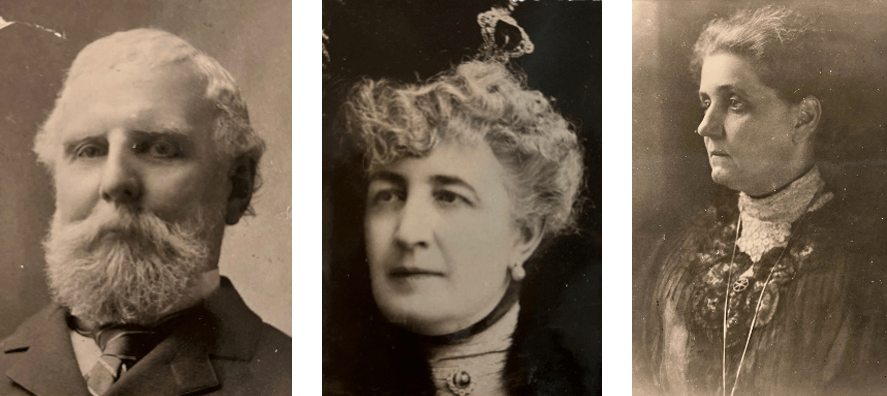
Left to right: Lyman J. Gage, Bertha (Mrs. Potter) Palmer and Jane Addams.
1894
Civic Federation Established
On February 3, 1894, the Secretary of State of Illinois issued the certificate of incorporation of the Civic Federation of Chicago. The first meeting of the Civic Federation was held at the Palmer House on February 15, 1894. Lyman Gage was named president, Bertha Palmer vice-president, and Jane Addams a trustee.
The committee of the Federation and the members thus appointed, making a total of 40, created a special committee to divide the work and nominate sub-committees for the various parts. The following divisions, with a special committee in charge of each, were adopted:
- Revenue laws, town and county relations, and special assessments
- City charter, administration, etc.
- Ballot law, primary election, and corrupt practices act
- The merit system in civil service
- Sanitation, charities, and educational matters
In those early days, the Federation advocated the cause of the poor and dispossessed, placed political action committees in each ward, and hired Pinkertons to clean out Chicago’s “dens of iniquity.”
In its early years, the Civic Federation attacked not only government waste and corruption, but also such problems as the gambling houses, run by professional gamblers who extorted $30,000 a month out of local businesses; the dangers of giving unsafe food products to babies; and the spotty records of some candidates for municipal judges.
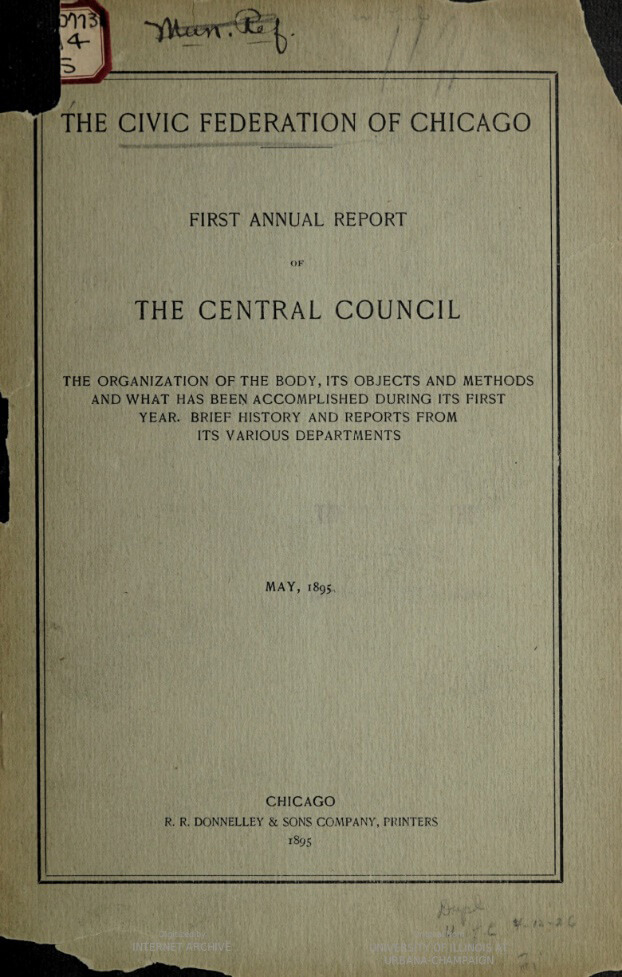
1895
First Annual Report
"It is the purpose of the Civic Federation to awaken in the minds of all citizens, irrespective of party, a sense of the obligations they carry to do their duty as directing factors in our great municipal organization."
— R. M. Easley, secretary of the Civic Federation
This quote from Civic Federation Secretary R. M. Easley was included in a letter addressed to “the 500 pastors of Chicago,” dated Feb. 8, 1895, and reprinted in the Federation’s first annual report.
1896
Helping Government Become More Productive
A Civic Federation committee, headed by Harry Gordon Selfridge, raised funds and hired men and teams to clean the City of Chicago’s streets for six months, demonstrating that it could be done for $10.00 a mile instead of the $18.50 the City had been paying. The following year, the City set street cleaning contracts at $10.50 a mile.

1898
Reforming Disparities in Tax Assessments
United with other civic and citizens’ committees and organizations, the Civic Federation led an effort to reform disparities in the assessing of taxes associated with Chicago’s township governments. In a special legislative session in 1898, a bill was passed that abolished the office of township assessor in Chicago and created in counties with over 125,000 people a tax assessing board and board of review to oversee those assessors.

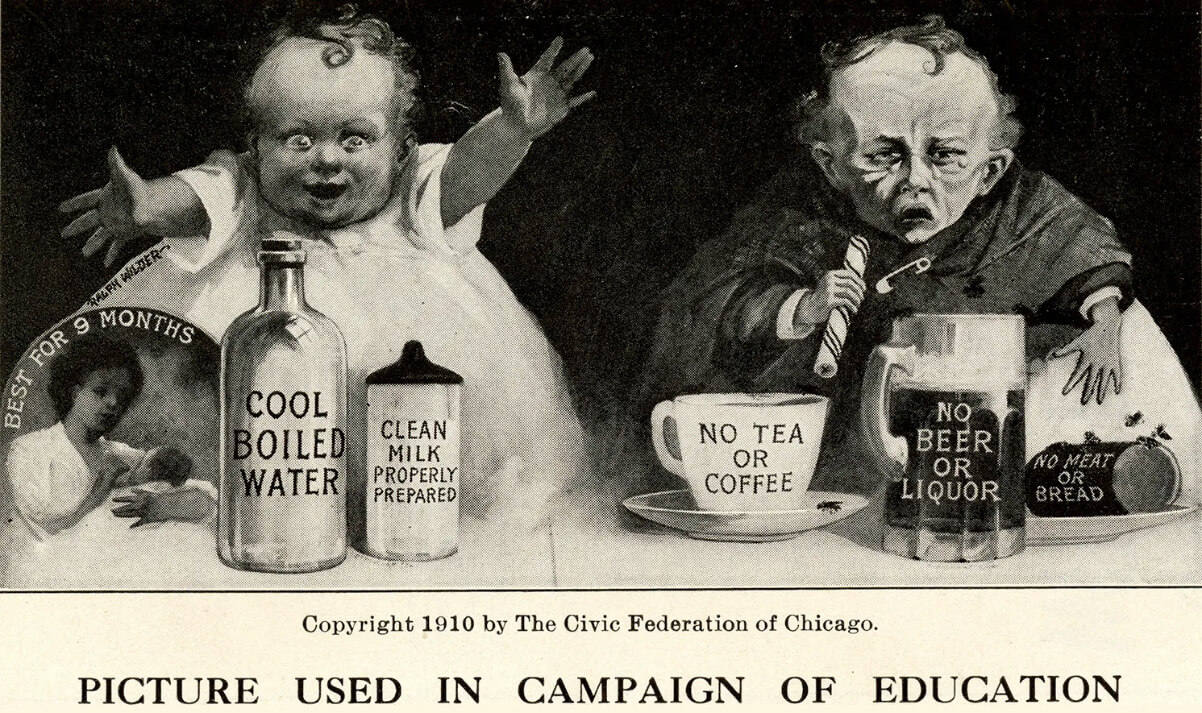
1903
Committed to Health and Sanitation
In 1903, three years before Upton Sinclair’s The Jungle was published, the Civic Federation organized an investigation of meat and milk inspection within the city limits, finding great laxity among inspectors. This effort expanded with the creation of a health and sanitation committee that published bacterial analyses of hundreds of samples of market milk from twenty-three of Chicago’s poorest wards. The Federation continued this work in the coming years, including efforts to inform the public on safe food and drink items for babies, as depicted in this illustration from a 1910 educational campaign.
1909
Influencing the Legislature on Tax Assessment
The Civic Federation persuaded the Illinois state legislature to pass a law authorizing the governor to appoint an Illinois Special Tax Commission that would make recommendations and suggest changes to the Illinois revenue system. This initiative grew out of a need to reform a tax assessment system that was convoluted, confusing, and ill-suited to cope with the taxation demands of rapidly-growing Chicago.

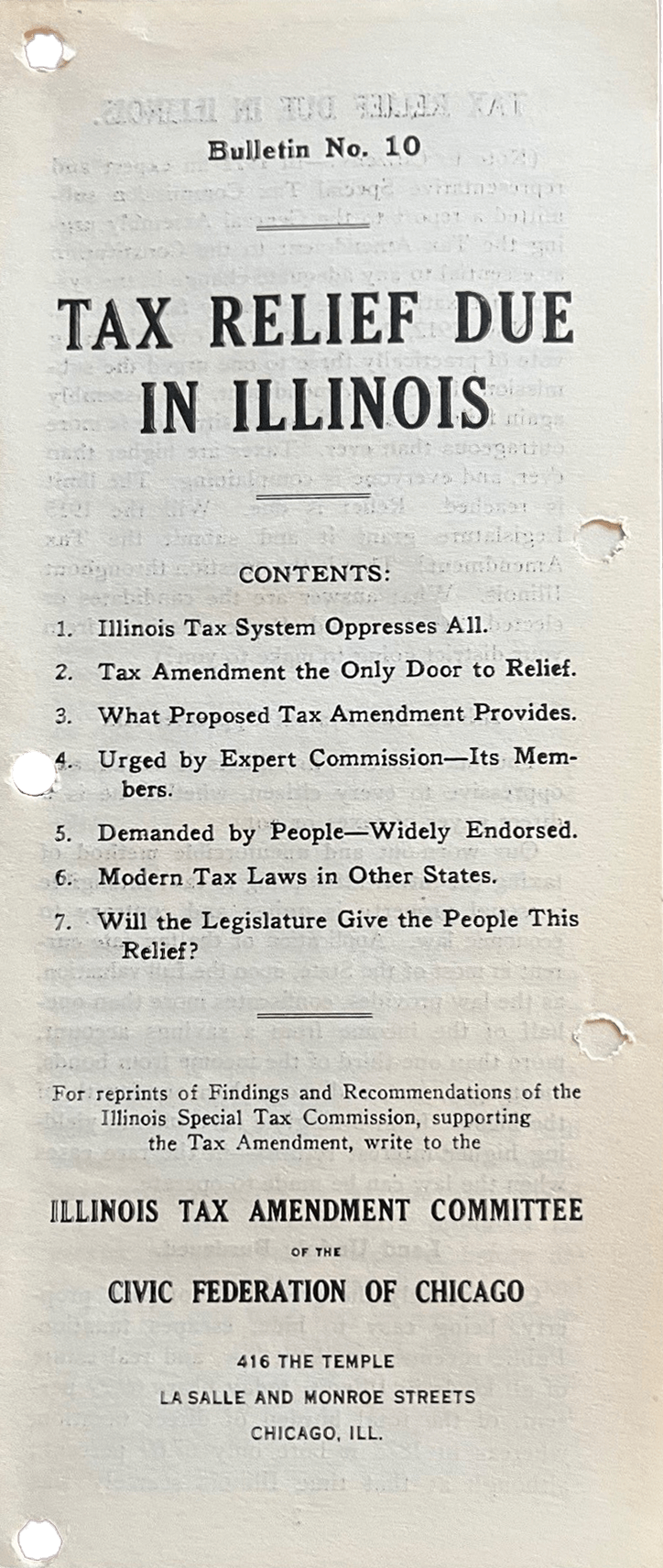
1913
Tax Relief Due
In the 10th edition of what would become a long-running series of Civic Federation bulletins, the Federation outlined concerns about Illinois’ existing tax system and advocated for a proposed tax amendment, providing details on tax laws in other states for comparison. The Civic Federation’s archives, which are primarily housed at DePaul University, contain many of these bulletins.
1913 & 1915
Shaping Criminal Justice Policy
In collaboration with other city agencies, the Civic Federation sponsored legislation to create an adult probation program that would give adult first offenders the opportunity to mend their ways without first being incarcerated with more serious offenders. The Civic Federation at this time also persuaded the Illinois General Assembly to strengthen parole law and provide stricter supervision of parolees.

1915
Public Employee Pension Reform
The Civic Federation worked to reform public employee pension funds. The Federation supported the creation of the Illinois Pension Laws Commission, and worked with City, County and State employees to follow the recommendations of the commission.

1917 & 1918
Prevention of Unnecessary Taxes
In response to calls from Chicago to Springfield requesting a special session to consider a special police tax projected to cost Chicago taxpayers over $7 million, the Civic Federation, in cooperation with the Chicago Bureau of Public Efficiency, issued analyses of the city’s financial situation to Governor Lowden showing the increase to be unnecessary. The special session was not called.

1926
Improving Zoo Tax Policy
The Federation fought the Forest Preserve District’s “Zoo” tax because of an unsatisfactory contract entered between the Forest Preserve District and the Chicago Zoological Society that was contingent upon passage of the tax. After a revised contract was drafted and signed, the tax was passed.

1929
Civic Federation Helps Chicago Weather Great Depression
Through its intimate knowledge of municipal finance, the Federation was credited with saving Chicago’s governments from financial catastrophe during the Great Depression. The Civic Federation assisted financing unemployment relief, served on a committee to develop legislation to finance distressed governments, reduced the number of Chicago taxing units and successfully protested a reassessment of personal property, which would have added further to the difficulties of the governments and costs to the taxpayers.

1929
Preventing Unsound Pension Plans
After the collapse of the Chicago fire pension in 1929, the fire union pursued two different unsound pension schemes that the Federation actively fought through a public relations campaign. Additionally, when the retired Chicago policemen’s union pushed to increase funding of its pension above that ordered by law, the Civic Federation took the union to the Illinois Supreme Court, where the court found that such increases jeopardized the interests of active employees, were contrary to public policy and contravened constitutional provisions.

1929
Road Not Taken
The Federation successfully campaigned against a $20 million bond issue for the “West Park elevated pleasure highway.”

1929
Preventing Property Tax Chaos
The Federation petitioned to the State Tax Commission against a reassessment of personal property for 1929, in opposition to the demands of tax strikers. A reassessment would have thrown Illinois’ tax coffers into chaos, and burdened taxpayers considerably.

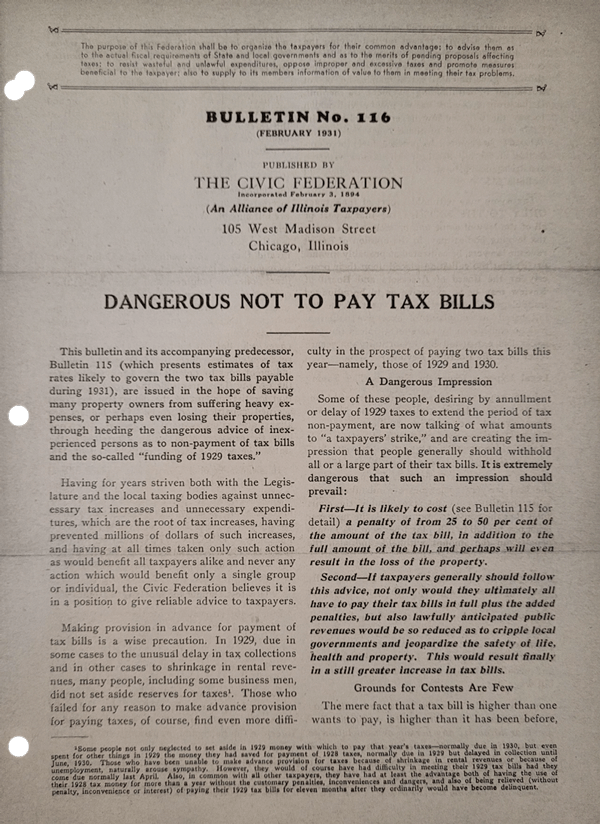
1931
Dangerous Not to Pay Tax Bills
Bulletin No. 116 of the Civic Federation, published in February 1931, outlines the risks of not paying one’s tax bills.
“… Having at all times taken only such action as would benefit all taxpayers alike and never any action which would benefit only a single group or individual, the Civic Federation believes it is in a position to give reliable advice to taxpayers.”
— The Civic Federation
Read a Longer Excerpt of this Bulletin
“This bulletin … [is] issued in the hope of saving many property owners from suffering heavy expenses, or perhaps even losing their properties, through heeding the dangerous advice of inexperienced persons as to non-payment of tax bills and the so-called ‘funding of 1929 taxes.’ Having for years striven both with the Legislature and the local taxing bodies against unnecessary tax increases and unnecessary expenditures, which are the root of tax increases, having prevented millions of dollars of such increases, and having at all times taken only such action as would benefit all taxpayers alike and never any action which would benefit only a single group or individual, the Civic Federation believes it is in a position to give reliable advice to taxpayers.”
1931
Reforming the Cook County Assessor’s Office
The Civic Federation successfully promoted the reform of the county assessor’s office, reducing it from a five-member board of assessors and three-member board of appeals to a streamlined one assessor, two-member board of appeals structure.

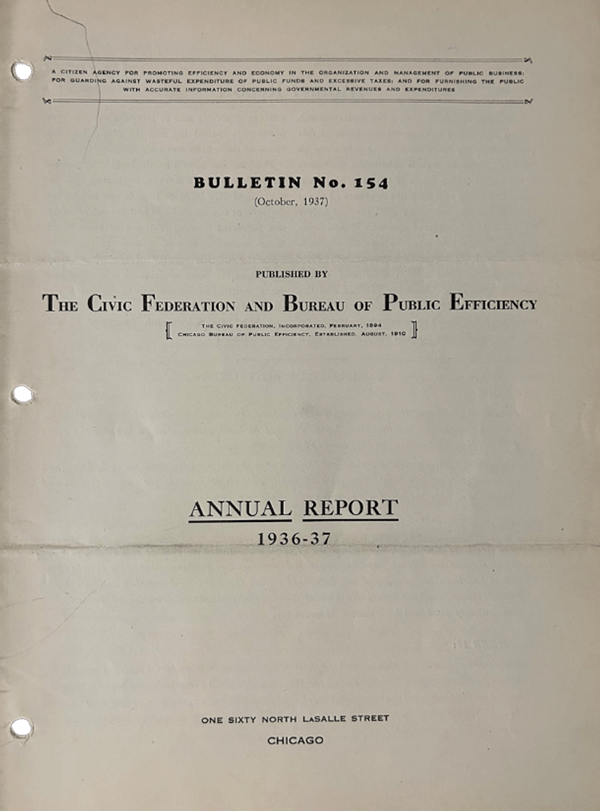
1932
Merger
In 1932, the Civic Federation merged with the Bureau of Public Efficiency and began operating under the joint name of the Civic Federation and Bureau of Public Efficiency, as illustrated in this 1936-1937 annual report. In 1941, the organization reverted to using its original name, the Civic Federation.
1934
Consolidating the Parks
In 1934 the Civic Federation realized one of the goals from its charter plan: to unite and consolidate the individual Chicago park districts. Up to this time, Chicago parks were governed by 22 districts, each with its own board of commissioners. While a measure to unite the parks failed in 1916, a later advocacy campaign assisted by then-governor Henry Horner was put to vote in the April 1934 primary election, where it found overwhelming support from the public.

1935
Successful Reduction of Taxes
Tax increases of $27 million were reduced to $18 million by the Illinois General Assembly on the strength of Federation data and research.

1938
A Call for Civic Engagement
The Civic Federation urged citizen participation to protest budget and tax increases of $9 million by some of the governments.

1939
Voter Education
The Civic Federation in 1939 distributed analyses of pending Cook County bond issues totaling $4 million in increases to voters, who defeated the bonds in June of that year.

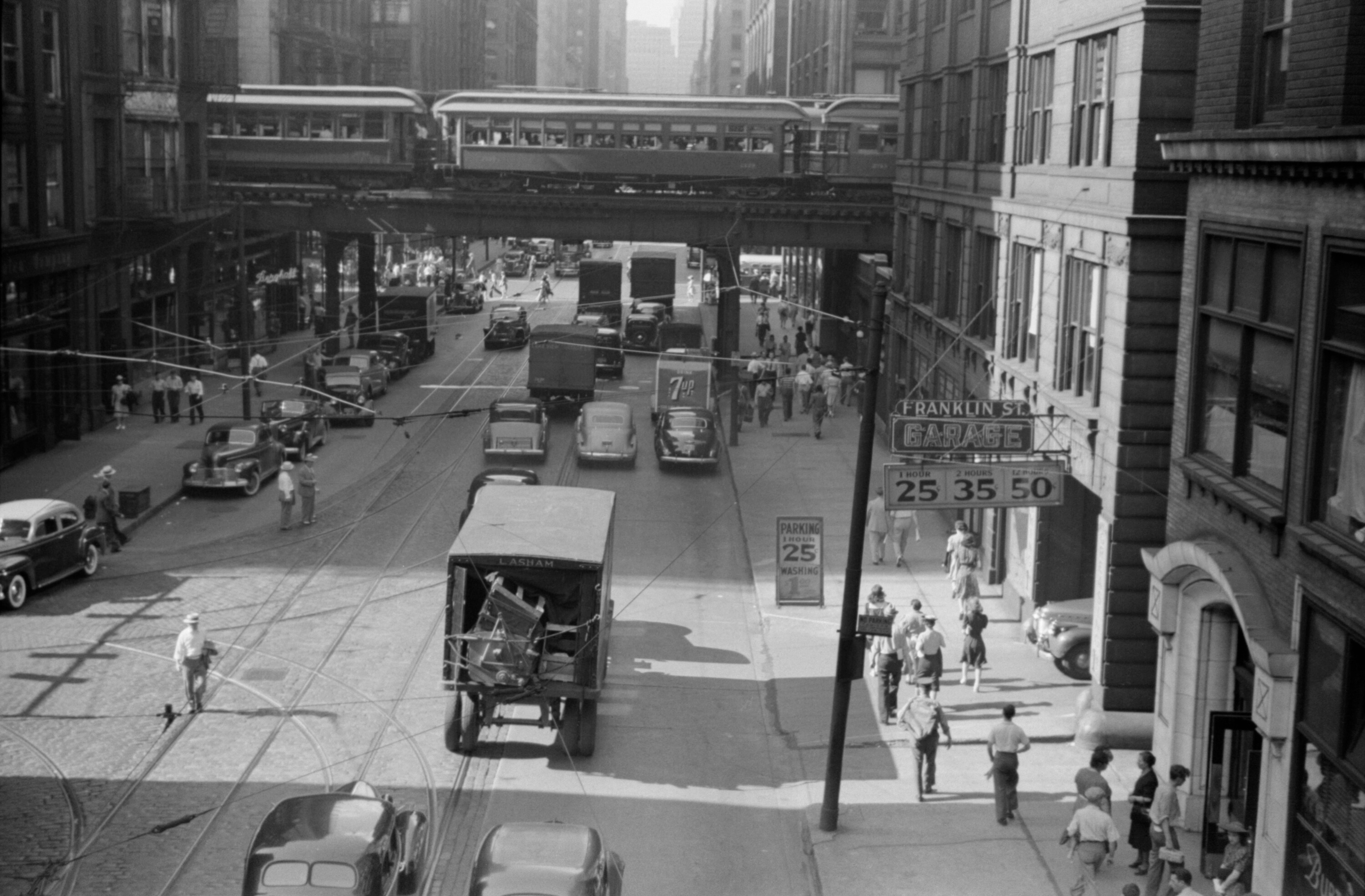
Chicago street view, 1941
1941-1943
Preventing Excessive Tax Increases
The Federation helped reduce tax increases by the millions during an Illinois General Assembly legislative session through budget analyses and research reports. The legislature limited tax increases to about $3,300,000 for 1941, $5,800,000 for 1942 and $3,100,000 for 1943.
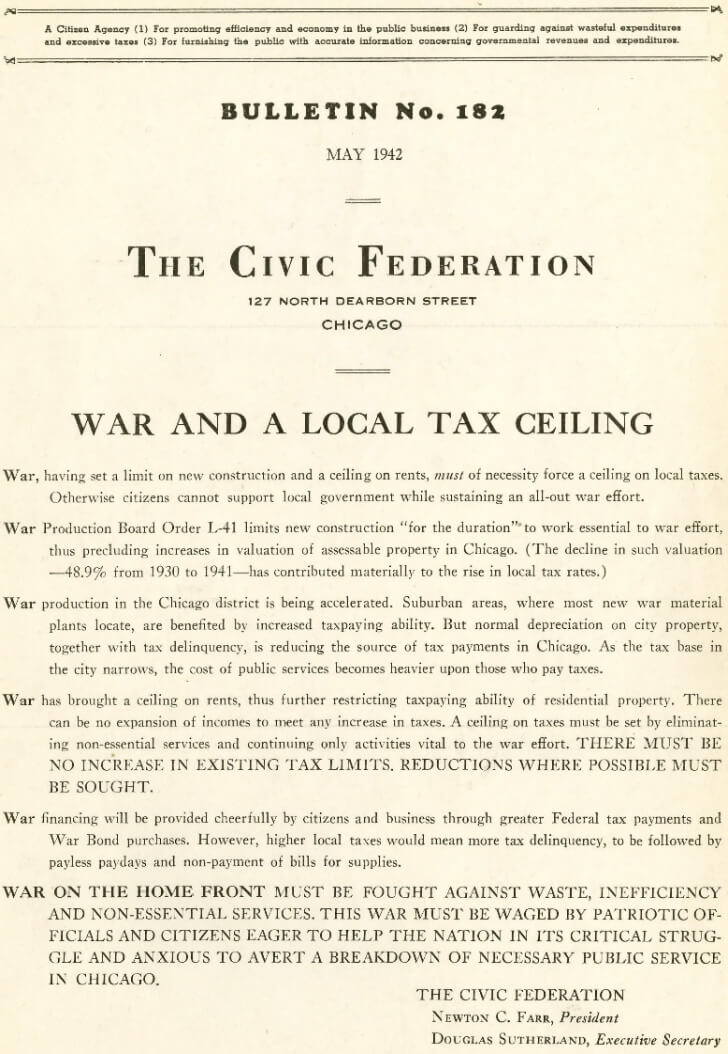
1942
WWII and a Local Tax Cap
A May 1942 bulletin from Civic Federation President Newton C. Farr and Executive Secretary Douglas Sutherland argues that “a ceiling on [local] taxes must be set by eliminating non-essential services and continuing only activities vital to the war effort.” Farr writes that in wartime, “there can be no expansion of incomes to meet any increase in taxes,” but noted that citizens and businesses would continue to support the United States’ war efforts by making “greater Federal tax payments and War Bond purchases.”
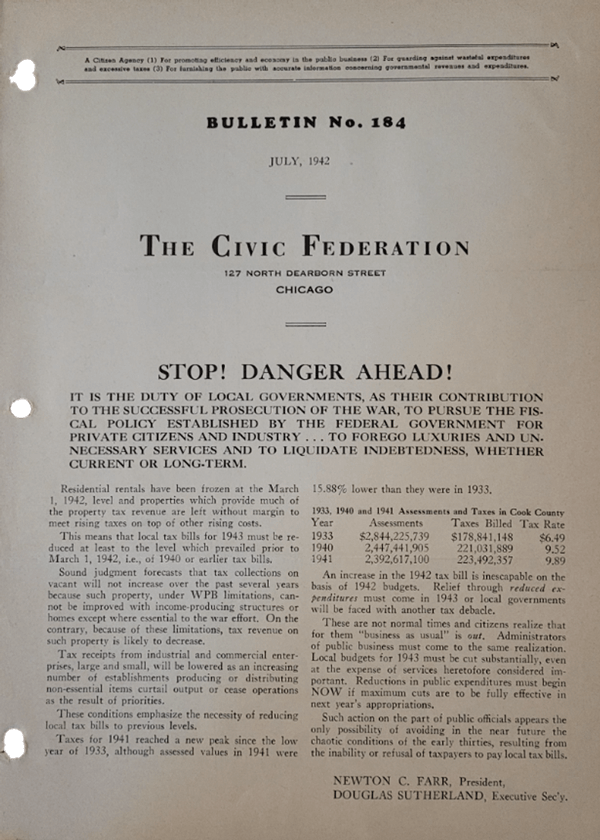
1942
Fiscal Policy in Wartime
This World War II-era bulletin from the Civic Federation advises governments on sound fiscal policy during this time of war.
“It is the duty of local governments, as their contribution to the successful prosecution of the war, to pursue the fiscal policy established by the federal government for private citizens and industry ... to forego luxuries and unnecessary services and to liquidate indebtedness, whether current or long-term.”
— Civic Federation President Newton C. Farr and Executive Secretary Douglas Sutherland
1943
Model Sanitary District
In 1943, the Civic Federation prepared legislation on the Model Sanitary District budget and fiscal control law, which was enacted.

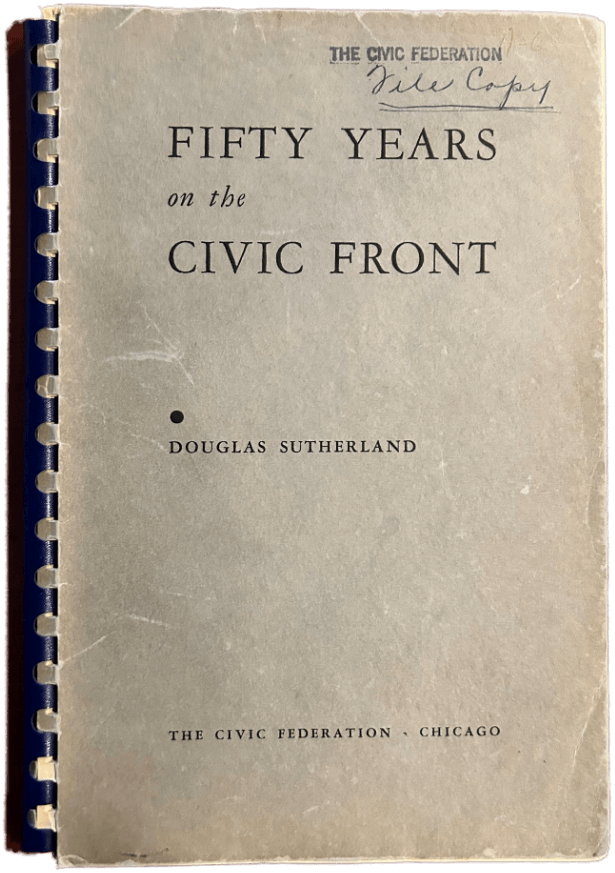
1944
Fifty Years on the Civic Front
A book-length report on the achievements of the Civic Federation during its first 50 years, titled Fifty Years on the Civic Front, was published by Civic Federation Executive Secretary Douglas Sutherland in 1944. In addition to serving as secretary, Sutherland was also the Federation’s historian.
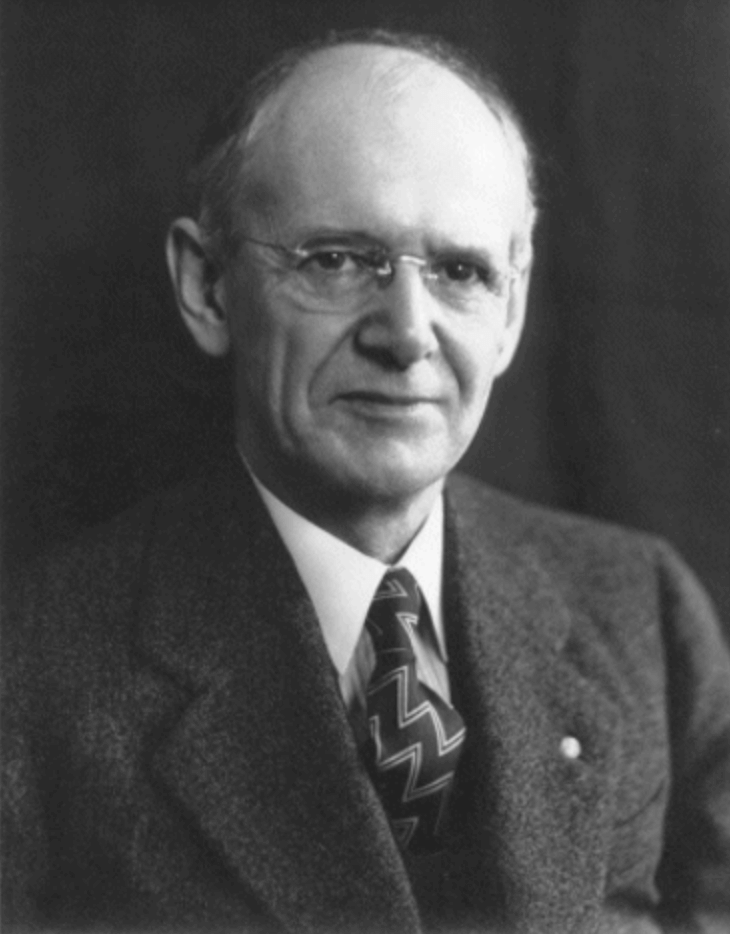
1944
Read the Opening Passage of Fifty Years on the Civic Front
Few Civic organizations can look back upon fifty years of unbroken activity. Numerous factors inherent in the character of Chicago have contributed to the Civic Federations' enduring vigor. These include lively citizen interest in the well being of the city, and vigilant attention given to local affairs by Chicago's newspapers, which has both reflected and stimulated this interest. In holding confidence and support for its community efforts, the Civic Federation has conducted its activities upon a strictly non-partisan and unbiased basis.It has made character and broad public interest the test in selecting its officers and policy-directing boards. The role of its presidents, from Lyman J. Gage and Bertha Honore Palmer down to the present time, is a roster of recognized public spirited citizens who have helped to stimulate Chicago's ideals and improve its conditions. It has aimed at accuracy and fairness in its statements, which issue only after well-considered board approval. It has sought worthwhile results through the cooperation of citizens and public officials, rather than its own exploitation. There may have been rare occasions in fifty years when its performance fell below those standards, but such achievements as it may claim can be credited to these rules of conduct, and to the vision and energy of its leaders. Another important factor in the Federation's longevity has been the readiness of its boards to recognize changing conditions and to shape the organization's course to meet them. Thus the history of the Civic Federation traces the evolution of citizen involvement.
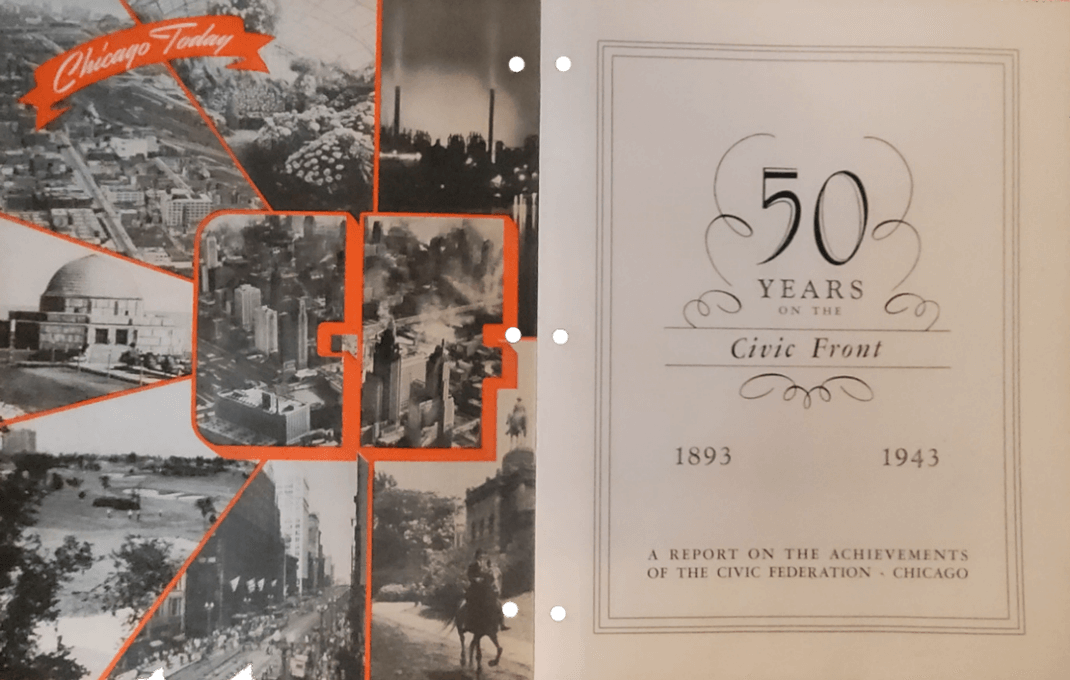
1944
A shorter magazine recapping key highlights of the Civic Federation’s first 50 years was also published.
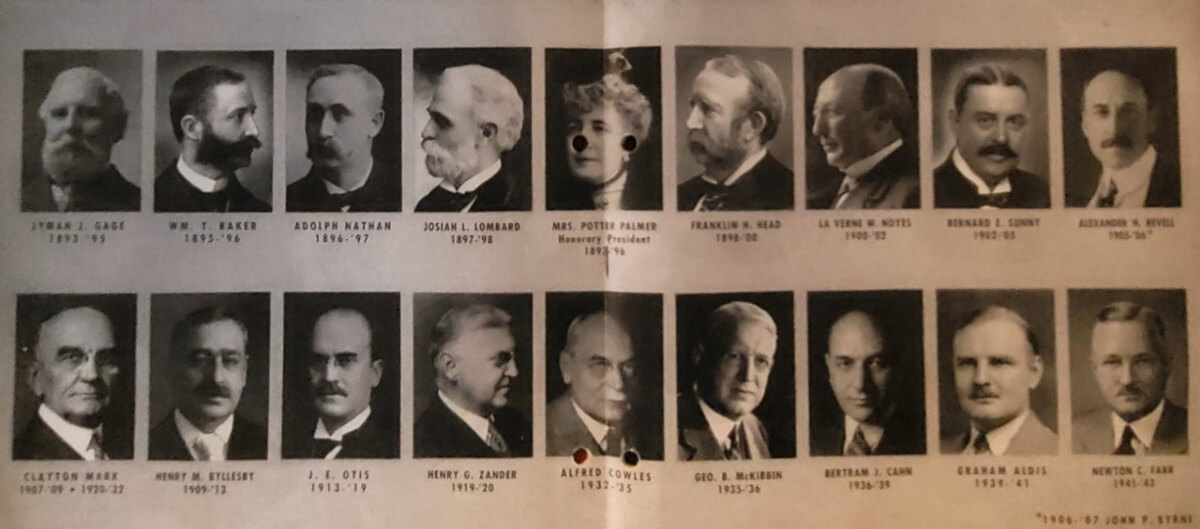
1944
Included in the magazine was a spread of headshots of the Civic Federation’s first 18 presidents, including Bertha Palmer, who was named an honorary president from 1893 to 1896.
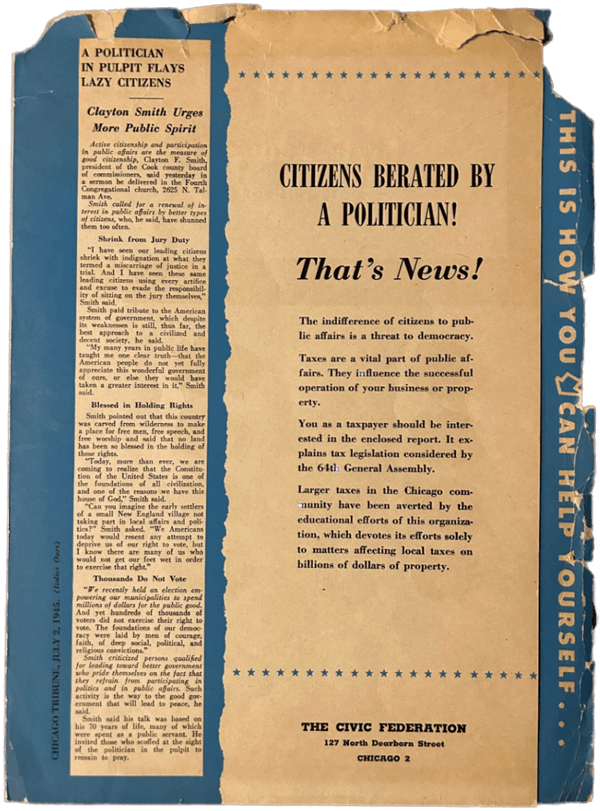
1945
Becoming a Tax Policy Watchdog
“The indifference of citizens to public affairs is a threat to democracy.”
— The Civic Federation
Pictured here are introductory materials accompanying a 1945 report on tax legislation under consideration by the 64th General Assembly. By the time this report was released, the Civic Federation had redirected its mission solely toward research and advocacy pertaining to tax policy.
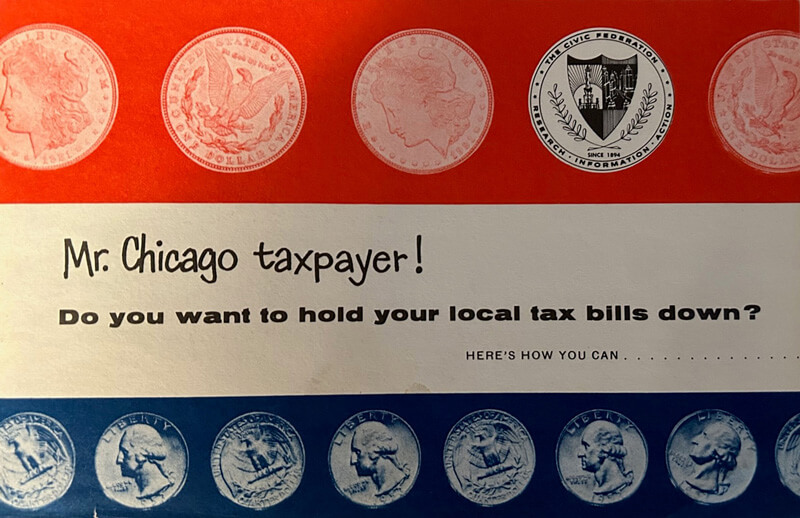
1954
Mr. Chicago taxpayer!
This 1954 booklet promoting Civic Federation achievements and membership opportunities showed how in 1953 alone, the Civic Federation saved Chicago property taxpayers more than $25 million:
- Defeat of new or additional taxes: $17 million
- Savings on tax-rate law sponsored by Federation: $2 million
- State aid to County (Federation helped secure it): $6 million
Total: $25 million
The savings meant an average reduction of almost 8% in 1953 tax bills.
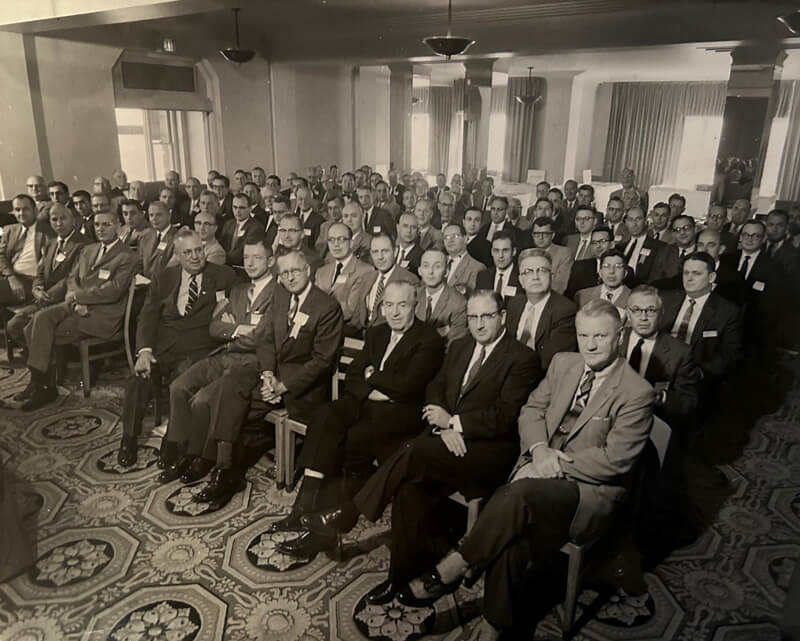
1957
Called to Order
The Civic Federation meets at Chicago’s Conrad Hilton Hotel, located at 720 S. Michigan Ave, in 1957. The hotel is today known as Hilton Chicago.
1958
Cook County Property Parcel Numbering System
In 1958, following the Civic Federation’s recommendation, Cook County implemented a property parcel numbering system, which helped determine the tax status of a parcel and facilitated the collection of property taxes. This new system supplanted the older method of organizing the million-plus properties in the County according to townships and subdivisions. This significant reform is still in operation today.

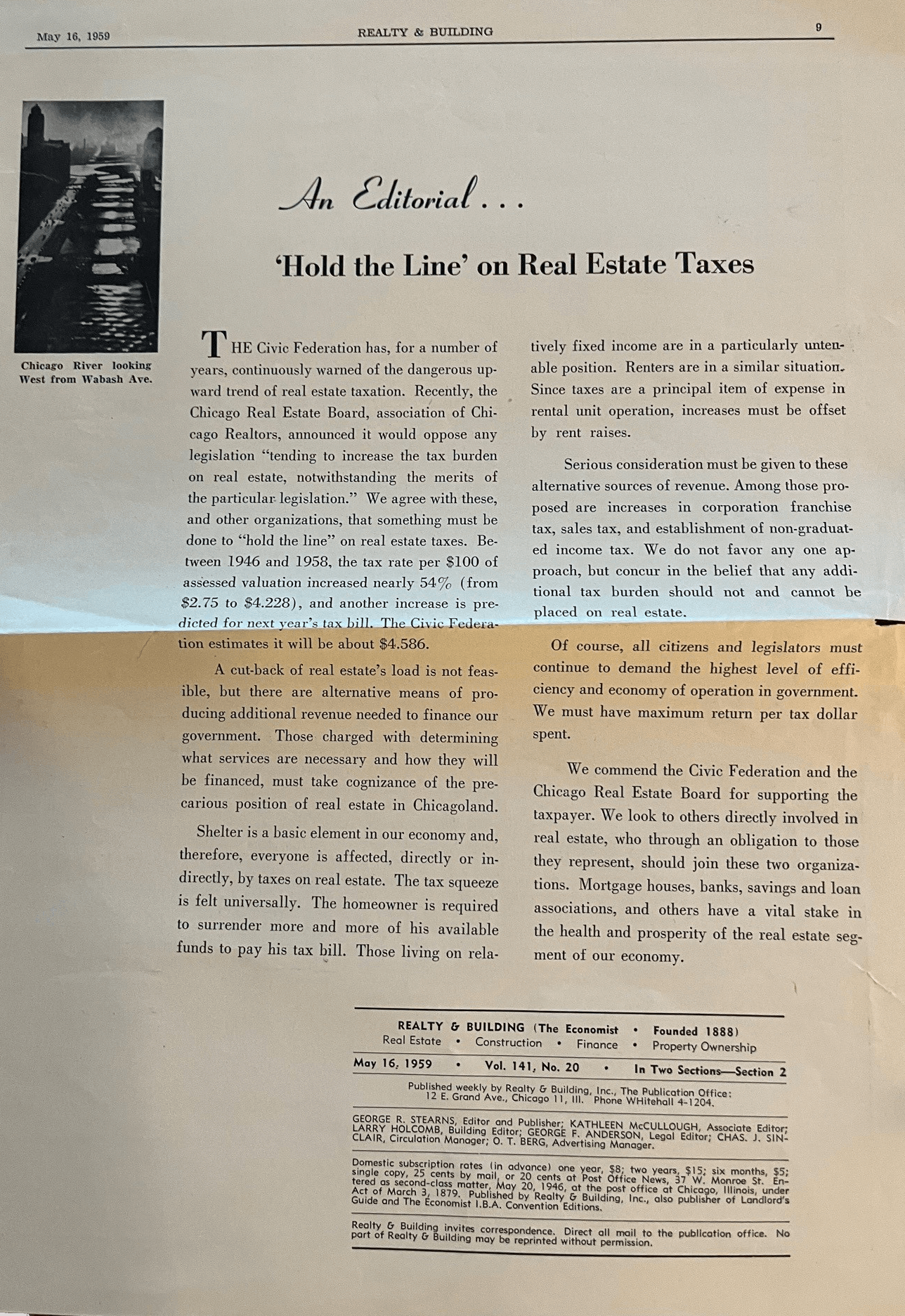
1959
‘Hold the Line’ on Real Estate Taxes
This May 16, 1959, editorial from Realty & Building commends the Civic Federation for having, “for a number of years, continuously warned of the dangerous upward trend of real estate taxation” and for “supporting the taxpayer.”
The editorial also notes: “Between 1946 and 1958, the tax rate for assessed valuation increased nearly 54% (from $2.75 to $4.228), and another increase is predicted for next year’s bill. The Civic Federation estimates it will be about $4.586.”
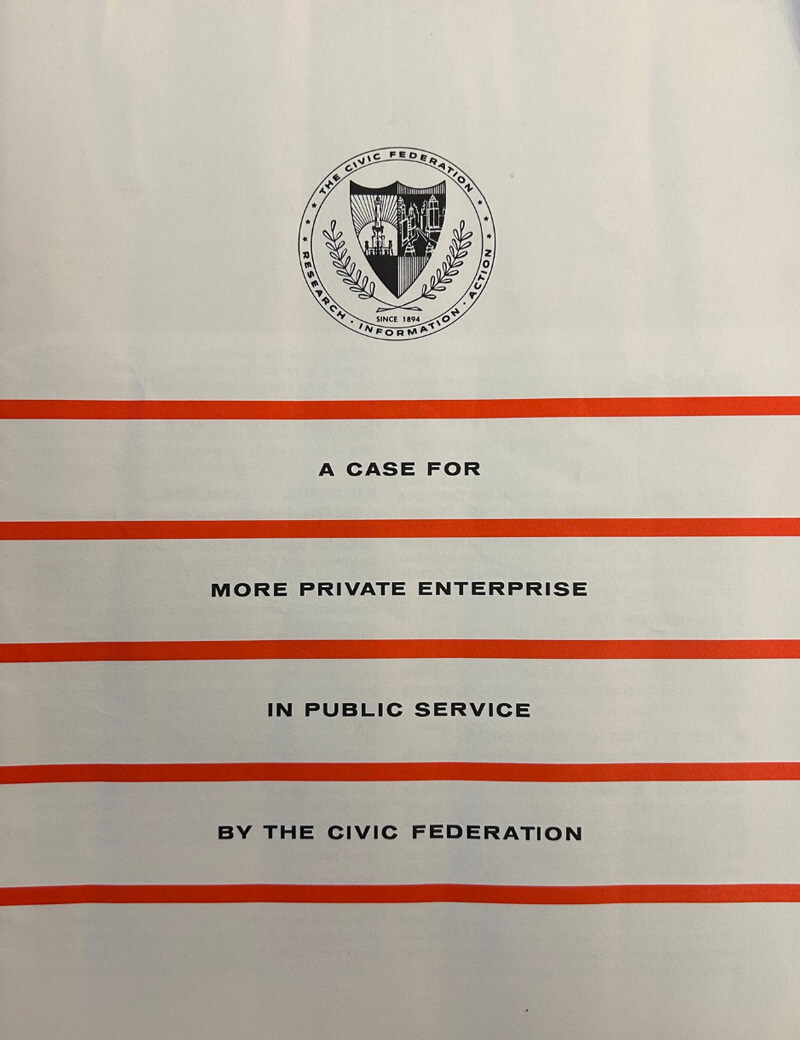
1964
A Call to Action
“Members of the Civic Federation come from all walks of life—businessmen, homeowners, industrialists. They have two common ties: they want taxes held to the minimum necessary for effective government, and they want their tax dollars spent prudently.”
— The Civic Federation, in a 1964 promotional booklet titled “A Case for More Private Enterprise in Public Service”
This booklet delves into the mission of the Civic Federation, local tax concerns and the benefits of membership of the Civic Federation.
What Is the Civic Federation?
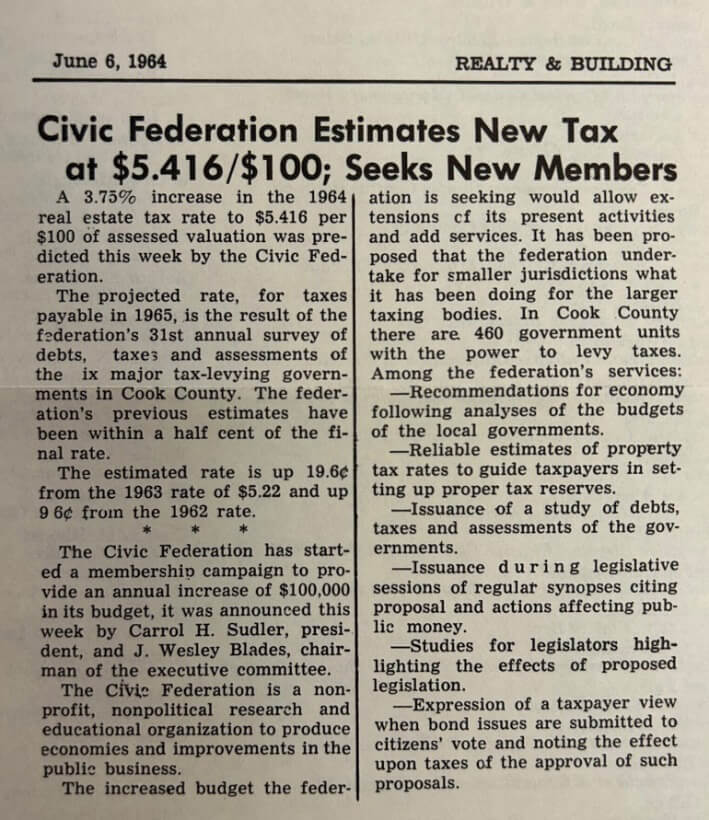
1964
Civic Federation in the News
This piece on the Civic Federation was published by Realty & Building, a Chicago-based publication.

1969
GRA Recognition
This 1969 award from the Governmental Research Association, of which the Civic Federation is still an active member, recognizes the Federation’s 75th Annual Report for its “Effective Presentation of Government Research.”
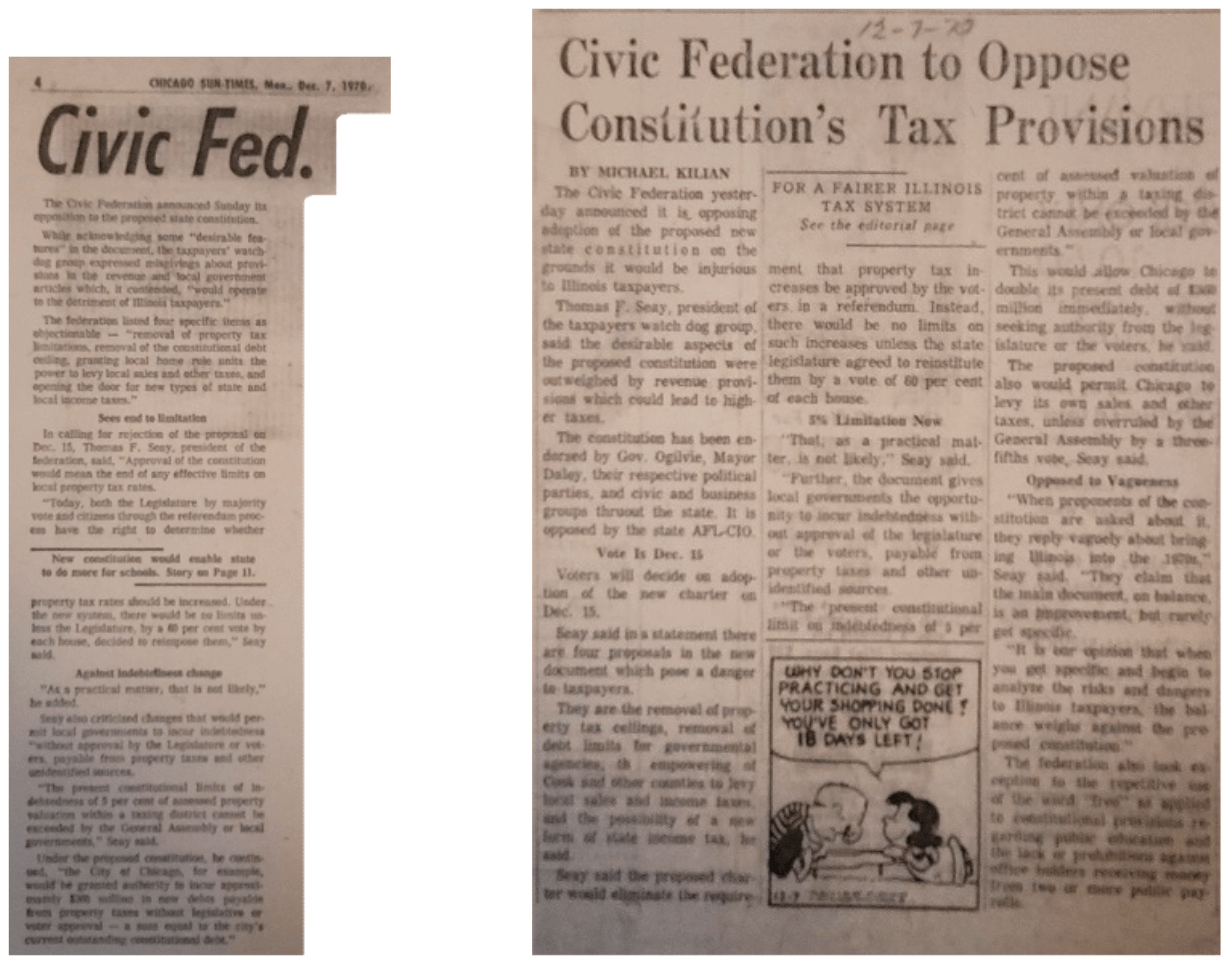
1970
Civic Federation Opposition to Proposed State Constitution’s Tax Provisions
In December 1970, the Chicago Sun-Times and an unidentifiable publication that was likely the Chicago Tribune covered the Civic Federation’s opposition to the proposed Illinois State constitution’s tax provisions. Civic Federation President Thomas F. Seay advocated in the latter piece against “four proposals in the new document which pose a danger to taxpayers. They are the removal of property tax ceilings, removal of debt limits for governmental agencies, the empowering of Cook and other counties to levy local sales and income taxes, and the possibility of a new form of state income tax.”

Michigan Avenue, Chicago, 1979
1979
School Finance Authority
In 1979, the Civic Federation proposed creation of the School Finance Authority to help resolve a school fiscal crisis that left the system in need of a financial bailout and unable to pay its employees. Created by the Illinois General Assembly in 1980, the School Finance Authority oversaw the Chicago Public Schools’ finances and approved its budgets, made labor contract recommendations, and worked with the school board to find funding sources.
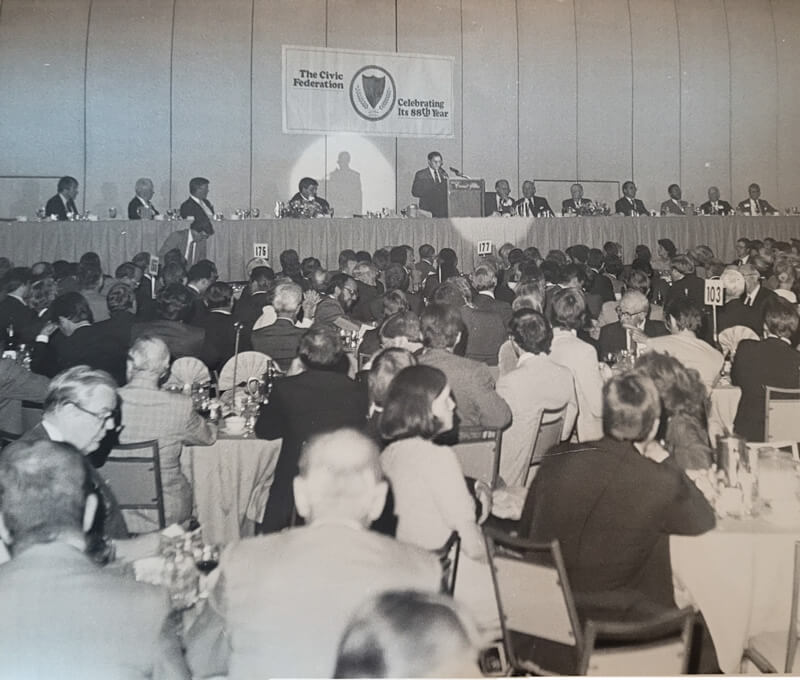
1981
Civic Federation Annual Awards Dinner
A photo from the 1981 Civic Federation annual awards dinner. The banner on the wall reads, “The Civic Federation: Celebrating its 88th Year.”
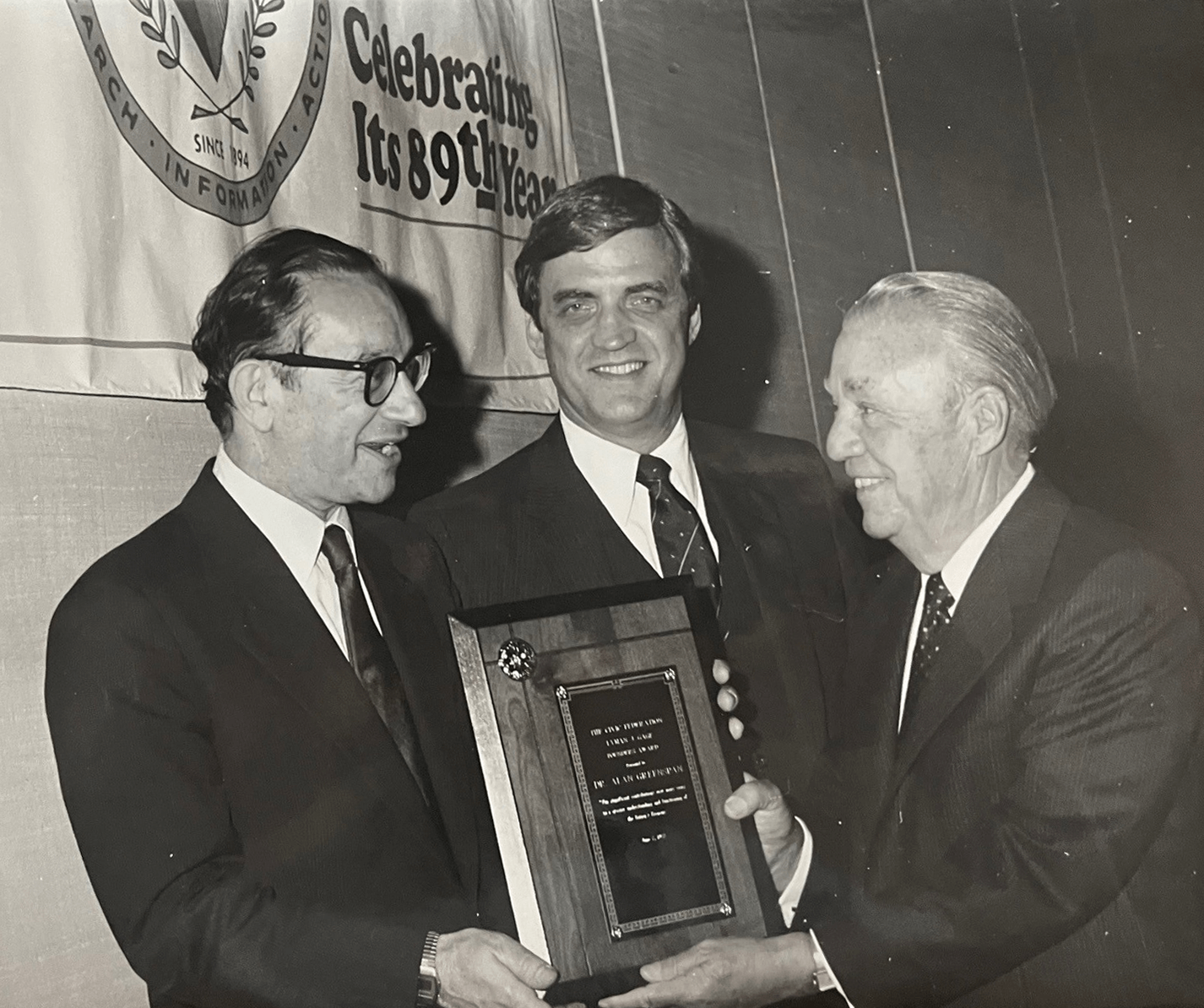
Left to right: Alan Greenspan, Civic Federation President Frank Coakley and James L. O’Keefe
1982
Inaugural Gage Award
Renowned economist Alan Greenspan was presented with the inaugural Lyman J. Gage Award at the Civic Federation’s 1982 annual awards dinner.
James L. O’Keefe was the 1937 founder of O’Keefe, Lyons & Hynes, LLC, a Chicago law firm that is still a member of the Civic Federation to this day.
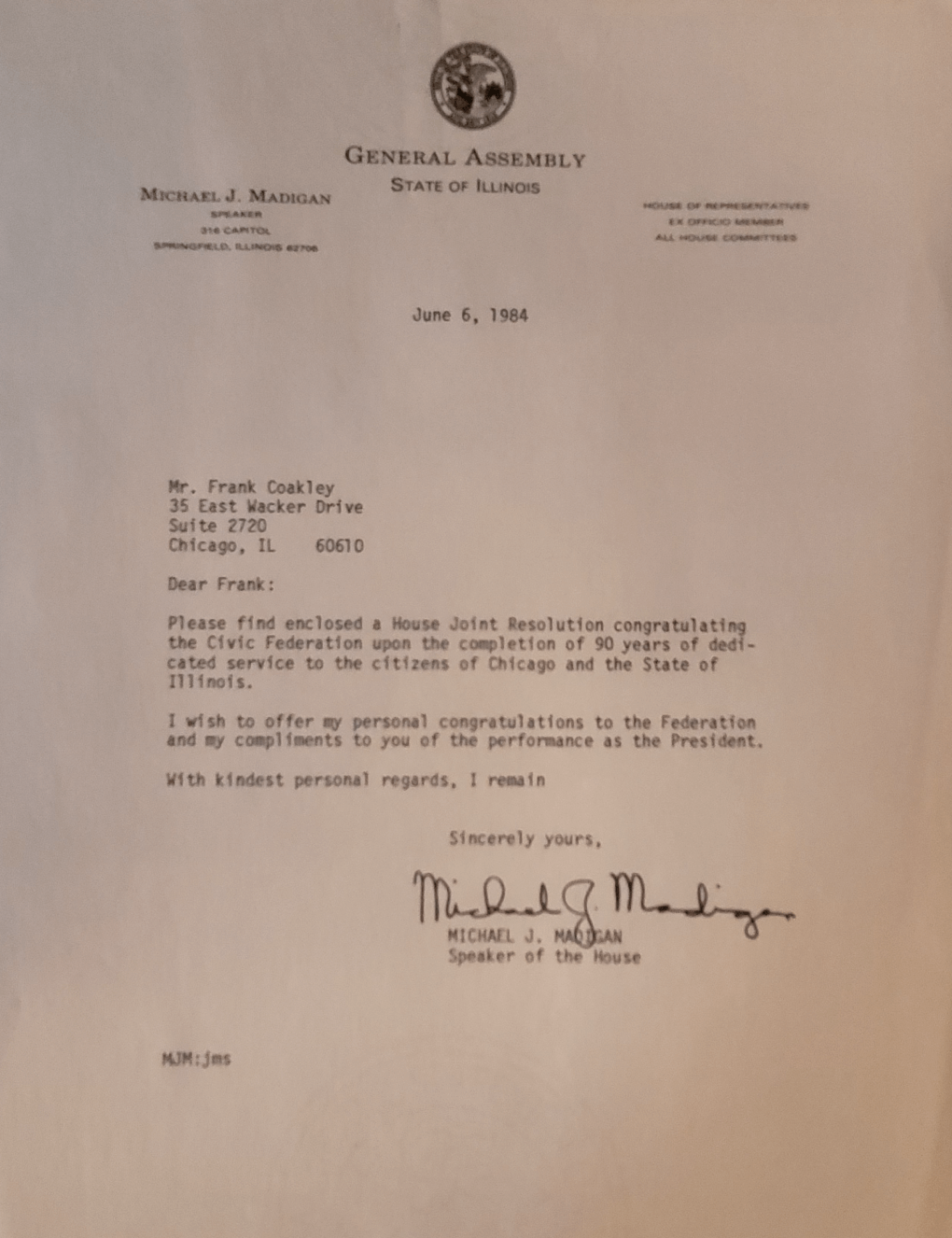
1984
Joint House Resolution Honors Civic Federation’s 90 Years of Service
A June 6, 1984, letter from Speaker of the House Michael Madigan congratulates the Civic Federation on the 90-year anniversary of its service to citizens of the City of Chicago and the State of Illinois.
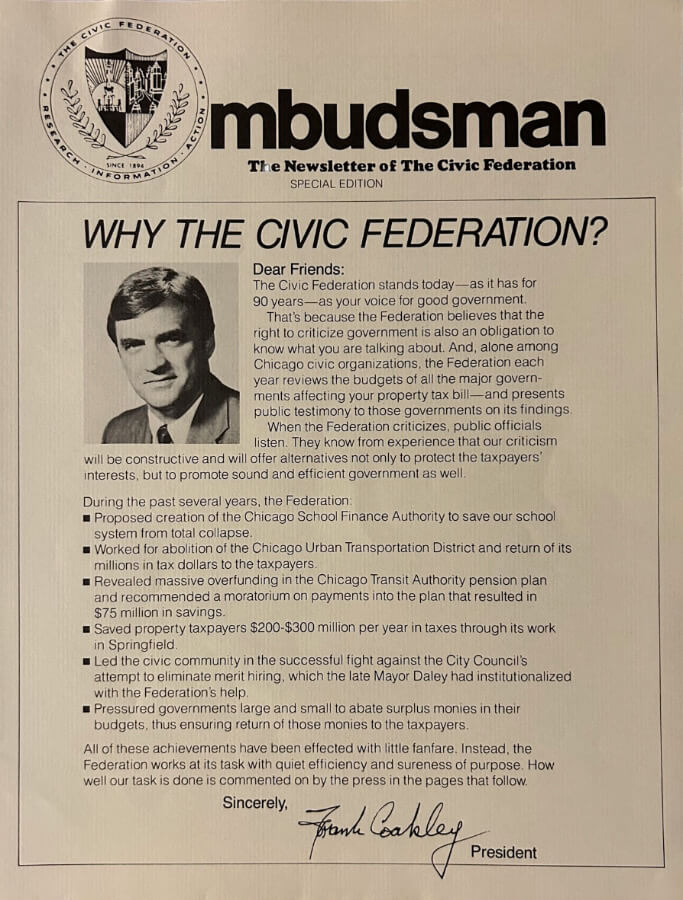
1984
Why the Civic Federation?
“… The Federation believes that the right to criticize government is also an obligation to know what you are talking about.”
— Frank Coakley, president of the Civic Federation
In a special 1984 edition of Ombudsman: The Newsletter of the Civic Federation, Federation President Frank Coakley outlines recent key achievements of the organization. This multi-page introduction to the organization also cites praise from media outlets.
“That steely-eyed watchdog of public purses. . . The Civic Federation is an alert guardian over local government spending habits.” — Chicago Sun-Times
“The Civic Federation deserves more support. Its valiant representatives sometimes find themselves the only speakers at budget hearings of the various taxing bodies.” — Chicago magazine
“The Civic Federation does the kind of work that good citizens ought to do but don’t have time to do. It is comforting to know that an organization like the Federation—staffed by highly qualified and dedicated professional government researchers—is on the scene constantly to keep track of the workings of government and the spending and taxation that are the result of those workings.” — Dan Miller, editor, Crain’s Chicago Business
Late 1980s
Reforming Government Through Data
In the late 1980s, the Civic Federation compiled the first comprehensive database of revenues and expenditures on over 1,100 local governments in the six-county Chicagoland area, and in the early 1990s, made proposals designed to reform the management and personnel systems of the Park District. The implementation of those reforms later got underway in the mid-1990s.

1993
Chicago Park District Reorganization
The Federation proposed structural reforms of the Chicago Park District to increase efficiency of its operations in a 1993 comprehensive analysis of the District’s form and function. Many of these recommendations were adopted by the Park District in its major reorganization effort in the mid-1990s.

1994
Fostering Budget Transparency
Beginning in 1994 and continuing in the years to come, the Civic Federation started promoting means by which the City of Chicago, Chicago Public Schools, City Colleges of Chicago, Chicago Park District and Forest Preserve District of Cook County could improve the transparency of their budget documents so that the public is better able to discern how taxpayer dollars are spent.

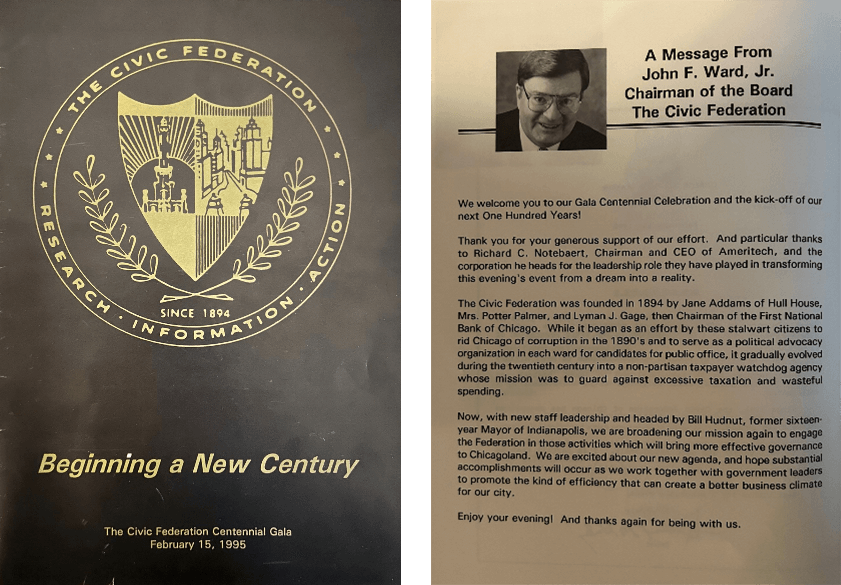
1995
Beginning a New Century
“Now, as The Civic Federation begins a new century of service, its mission is becoming broader than just fiscal policy, although work on such issues continues to be its backbone. Regional and economic development issues are forging into the focus of its research, and greater emphasis is being placed on preparing recommendations that will help local systems of governance to become more efficient, accountable and effective.”
— John F. Ward, Jr., chair of the board of the Civic Federation, in the opening letter of a booklet that was printed for distribution at the Federation’s Feb. 15, 1995, Centennial Gala
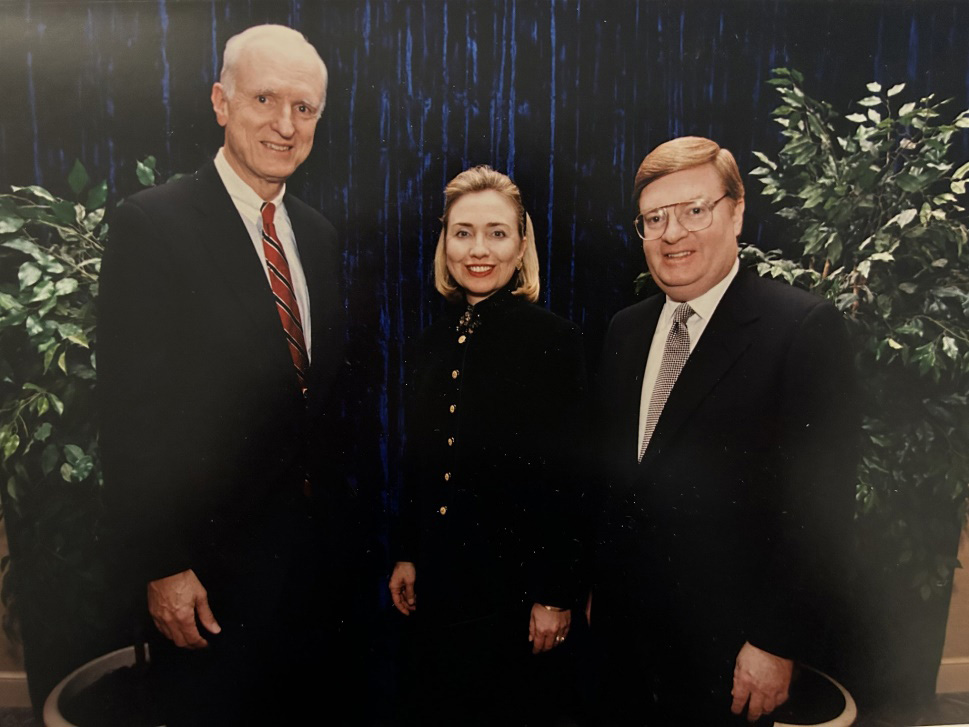
First Lady Hillary Clinton attends the Civic Federation’s 1995 Centennial Gala. Left: Former Mayor of Indianapolis William H. Hudnut, III. Right: Civic Federation Board Chair John F. Ward, Jr.
1995
Civic Federation Centennial Gala
1995
Property Assessment Appeal Reforms
The Civic Federation drafted and successfully advocated for historic reforms in the Cook County assessment appeals process. This involved the creation of a Task Force and publication of a report that was read in toto into House Bill 1465 in the spring of 1995 and became Public Act 89-126 later that year. The legislation streamlined property tax objection procedures, clarified the hearing process and eliminated the doctrine of constructive fraud, which had made it extremely difficult for taxpayers to successfully challenge Cook County property assessment valuations. The constitutionality of the law was upheld by the Illinois Supreme Court in People ex Rel. Devine v. Murphy in 1998. In that case, the Civic Federation filed an amicus curiae brief in support of the law. The Governmental Research Association recognized the significant work of the Federation on this issue in 1998 with a special achievement award.

1997
Protecting Chicago Taxpayers
The Federation assisted downtown Chicago taxpayers in 1997 in the return of $49 million in property taxes paid into the Central Area Circulator Project fund. This was a major victory for property owners immersed in the tax appeals process and won a Government Research Association Award for Special Achievement.

1998
A Major Victory for Property Owners
The Civic Federation helped author a tax appeals law that recommended a series of changes in property tax appeals procedures. This was a major victory for property owners immersed in the tax appeals process.

1999
TIF Transparency
The Civic Federation took a leadership role in promoting transparency in Tax Increment Finance (TIF) reporting during the 1999 TIF reform legislative process.

2001
Saving Governments Money on Employee Prescriptions
The Federation coordinated a successful initiative to bring together seven major Chicago area governments in an agreement to jointly purchase prescription drugs for their employees. The governments included the City of Chicago, Cook County, Chicago Public Schools, Chicago Transit Authority, Chicago Park District, City Colleges of Chicago, and Chicago Housing Authority. The original intergovernmental agreement to jointly purchase prescription drugs has yielded millions of dollars in savings for the affected governments.

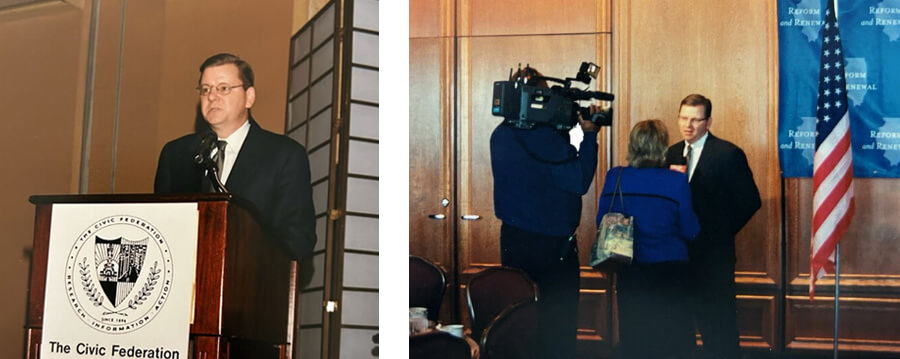
The photos here show Laurence on March 19, 2003, speaking at the Civic Federation’s annual award luncheon at Westin River North, and on May 20, 2003, being interviewed by the media following a luncheon with then-Illinois Governor Rod Blagojevich.
2002
Laurence J. Msall Named President of the Civic Federation
The Civic Federation named Laurence J. Msall president of the organization in January 2002. His transformational leadership of the Civic Federation would stretch 21 years, until his passing in 2023, at age 61.
Laurence’s Background
2003
Launch of State of Illinois Budget Analyses
In 2003 the Civic Federation released its first-ever analysis of the State of Illinois budget. Prior to the report, the Federation’s analysis work had been focused on Chicago-region local governments.
The Civic Federation supported the FY2004 $52.4 billion State budget because it successfully eliminated a $5.4 billion deficit without any broad-based tax increases. The Federation reiterated its support for the pension obligation bond issue to reduce the State’s unfunded pension liabilities but issued several cautions as well.

2005
The Effects of the 7% Cap
On Sept. 19, 2005, the Civic Federation released a report titled The Effects of the “7% Cap” on Property Taxes Paid in the City of Chicago: Tax Year 2003. The report found that the "7% cap" resulted in an 11.5% total reduction in property tax owed by homestead exempt properties and a 4.5% increase for all other properties in Chicago, tax year 2003.

2006
Funding for Cultural Institutions
The Civic Federation helped raise awareness of the serious funding issues confronting the Chicago region’s major cultural institutions and proposed a new system for their public funding. The effort involved convening a steering committee and task force, which included representatives from Museums in the Park, the Chicago Park District, and the Cook County Board of Commissioners; commissioning a major statistical study of the economic impact of cultural institutions on the region’s economy; and the publication of a research report.

2006
Abolishing the Cook County Suburban Tuberculosis Sanitarium District
The Civic Federation led a three-year campaign to abolish the Cook County Suburban Tuberculosis Sanitarium District, a historically inefficient government with questionable financial management. The effort included publication of a research report in 2003, a public education campaign, and the 2006 passage of legislation sponsored by State Senator Don Harmon and State Representative Elaine Nekritz.

2007
Alternative General Homestead Exemption
In 2007, the Civic Federation released a report on the effects of the Alternative General Homestead Exemption, finding that if the measure was not extended for another three years, property taxes in the Englewood neighborhood would rise by a median of 162%.

2007
Focus on TIF
The Civic Federation in November 2007 published two pieces on Tax Increment Financing (TIF): an issue brief and a position statement.
The issue brief explained the impact of TIF on taxpayers and local governments in Illinois, while also reviewing the TIF designation process and recent empirical research on TIF and providing detailed information on selected City of Chicago TIF Districts.
The position statement clarified that while the Civic Federation supported Tax Increment Financing as an economic development tool, it also recommended that there be much greater transparency in the quantity and quality of TIF information provided to the public. The Federation also recommended including full financial information about TIF in all municipal budgets, making TIF information easily accessible on the internet and undertaking a comprehensive review of each TIF district every 10 years.

2007
Health Services Inefficiencies Addressed
The Federation spearheaded an effective campaign in 2007 and early 2008 to establish an independent governing board for the Cook County Bureau of Health Services in coalition with other civic groups and business and government leaders. Through testimony before the County Board and a public education campaign that included letters to the editor published in major Chicago newspapers, the Civic Federation continued previous efforts to improve the efficiency of what is now called Cook County Health, which had long been plagued by financial and managerial inefficiencies. Since the creation of the CCH Board, the Civic Federation has been one of the organizations that serve on the nominating committee, making recommendations for Board members to the County Board President.

2008
Advocating to Solve a Transit Funding Crisis
The Civic Federation’s advocacy was key to the adoption of a comprehensive solution to the Chicago Transit Authority fiscal crisis in 2008. Through testimony before the House Mass Transit Committee, letters to the editors of Chicago area newspapers, and meetings with legislative leaders, the Civic Federation supported Illinois State Representative Julie Hamos’ all-inclusive mass transit legislation (P.A. 95-0708) that not only increased funding to the CTA, but also included pension and retiree health care reforms and increased Regional Transit Authority oversight.

2008
Port District Analysis
The Civic Federation issued a report in 2008 that reviewed the operations and finances of the Illinois International Port District (IIPD). In that report, the Federation called for the dissolution of the Illinois International Port District and the transfer of its operations to the City of Chicago. It found that the District had shifted its primary focus from port operations to the management of a golf course. Though the golf course brought in over half the District's annual revenue, the Civic Federation found no evidence that those revenues had been reinvested to improve port facilities or promote commerce.
Revisiting this topic in 2023, the Federation published a blog post demonstrating how the Port District has made strides toward improving the transparency of its operations.

2008
A Call for a Separate Forest Preserve District Board
In 2008, the Civic Federation released a joint report with Friends of the Forest Preserves calling for the creation of an independent board of commissioners for the Forest Preserve District of Cook County. The report found that the existing arrangement wherein the Cook County Board of Commissioners also served as the governing board for the Forest Preserve District had resulted in conflicts of interest and neglect of the preserves.

2008
MacArthur Foundation Grant Funds Launch of New State of Illinois
In 2008, the Civic Federation announced it would launch a new institute focused on State of Illinois research thanks to a generous multi-year grant from the John D. and Catherine T. MacArthur Foundation. The Institute for Illinois' Fiscal Sustainability (IIFS), which operated from 2008 to 2018, provided timely fiscal policy analysis to the State of Illinois with a focus on healthcare, Medicaid, infrastructure and debt, and made recommendations to State officials, the media and the public through education and digital outreach. Since the end of the grant, the Civic Federation has continued to produce annual research into the State of Illinois’ budget, pensions and more.

2009
Enabling Olympics Oversight
Based upon recommendations made by the Civic Federation in its analysis of the Chicago 2016 Olympic Bid, the Chicago City Council in September passed an ordinance that authorized Council oversight over Olympics operations and spending if Chicago was awarded the Olympics.

2009
Preventing Unnecessary Taxes
In 2009 the Cook County Board voted to partially roll back a one percentage point sales tax increase. The Civic Federation supported the rollback and had been a vocal opponent to the hike. The Federation found the tax unnecessary at a time when, it said, the County had made little attempt to implement cost savings or structural reforms despite severe economic uncertainty.

2009
Olympics Bid Analysis
On June 30, 2009, the Chicago City Council passed a resolution asking the Civic Federation to conduct a review of the financial projections made by Chicago 2016 for the City’s bid to host the 2016 Summer Olympic Games. Specifically, the resolution asked the Federation to deliver a report and recommendations to the City Council on Chicago’s proposed financing of the 2016 Games and any financial impact on taxpayers. The Civic Federation agreed to undertake an independent review of the City’s bid for the 2016 Olympic Games with support from several foundations. The Federation’s final report found that the proposed operating budget for the Chicago 2016 Bid provided adequate protection for taxpayers. However, the development of the Olympic Village still exposed the City to continuing real estate risks that needed to be managed. In order to effectively carry out this plan and manage the risk associated with construction of the Village, the Civic Federation and our consultant L.E.K. Consulting recommended the following:
- The City Council must exercise its oversight role and require regular reporting on the status of the Games, including public disclosure of budgets, contracts, and construction updates to the City Council.
- The Olympic Bid’s proposed insurance coverage must be purchased to manage the risk to taxpayers that comes with guaranteeing delivery of the Games.
- The Organizing Committee for the Olympic Games must be led by a professional and experienced management team that understands and executes the proposed Chicago 2016 plan.

2009
Introducing the Civic Federation Blog
In mid-2009 the Civic Federation launched an upgraded website that included the addition of a weblog. The blog’s posts were written by Federation staff and focused on Civic Federation research, provided commentary on events in the news and highlighted other topics on government finance. The Federation’s weekly blog posts have since become a fundamental component of its research products, functioning as a timely resource for the media, government officials and the public and frequently garnering the highest visitor traffic of all the Federation’s web content.

2009
10 and 25 Cook County Property Classification Ordinance
In 2008 Cook County Assessor Jim Houlihan proposed amending the Cook County Classification Ordinance to change the levels of assessment to 10% for residential, vacant and apartment properties, and 25% for commercial, industrial and non-profit properties. The Civic Federation supported this proposal as a means to bring greater transparency to the property tax system, while simplifying the classification system. Civic Federation President Laurence Msall testified to this effect at a meeting of the Cook County Board of Commissioners; the proposal passed in September of 2008. Mr. Msall also served on Cook County Board President Todd Stroger’s Cook County Property Tax Classification Task Force, which was convened in order to study the potential effects of the ordinance change and advise the Cook County Board of Commissioners.

2009
Property Tax Primers and Comprehensive Position on Cook County Property Tax System
Beginning in late 2009 and continuing through 2010, the Civic Federation produced a series of four Cook County property tax primers. It followed up the series with the release of its comprehensive position on Cook County’s property tax system, including its recommendations for reform.
Nov. 17, 2009 - Cook County Property Tax Appeals: A Primer on the Appeals Process with Comparative Data for 2000-2008
April 5, 2010 - The Cook County Property Assessment Process: A Primer on Assessment, Classification, Equalization, and Property Tax Exemptions
Nov. 22, 2010 - The Cook County Property Tax System and Fundamental Principles of Taxation
Dec. 20, 2010 - Civic Federation Position on the Cook County Property Tax System: Recommendations for Reform

2010
Ensuring Government Accountability
The Illinois General Assembly heard the Civic Federation’s call for a State of Illinois accountability and performance reporting system when Senator Dan Kotowski inserted a measure into the FY2010 budget implementation bill that would create a system by which State agencies would be required to continuously improve accountability and reporting, which would provide citizens with the most effective and efficient programs.

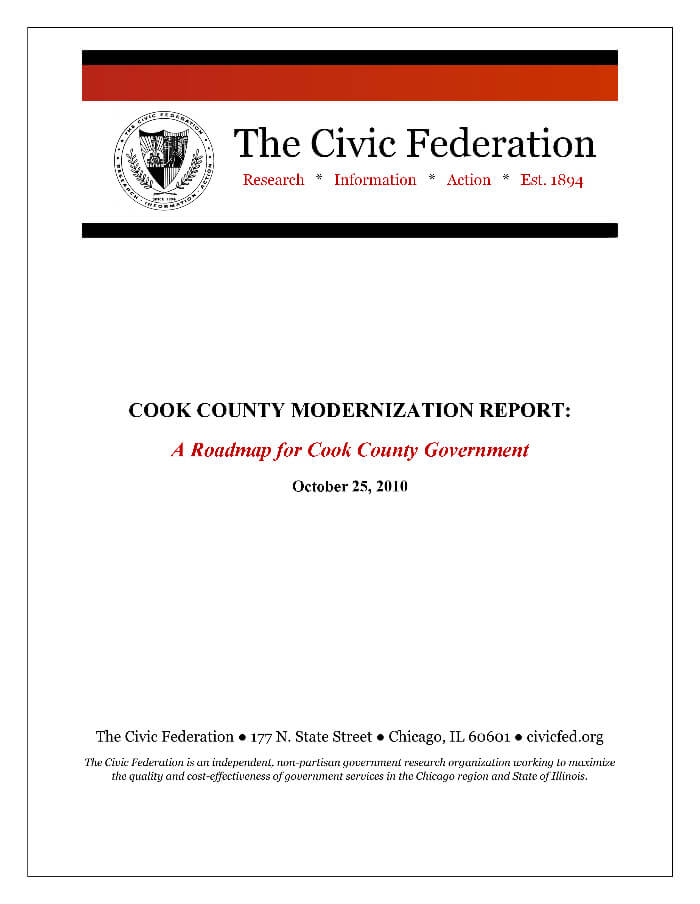
2010
Cook County Modernization Project
In 2010, the Civic Federation published the Cook County Modernization Project, a roadmap for transforming Cook County into a government that is more efficient, less costly and more accountable. The project won the 2012 Governmental Research Association Outstanding Policy Achievement Award.
Project Impacts
2010
Transforming Medicaid
The Medicaid reform legislation the State of Illinois approved in December included many initiatives that were recommended by the Civic Federation in its Medicaid Issue Brief and in the Medicaid sections of reports over the previous three years. Those recommendations included instituting managed care programs for disabled and elderly Medicaid patients and global budgeting for the Medicaid program, which will ensure that the many departments running the Illinois Medicaid program work together toward program goals rather than protecting the line items in their own budgets.

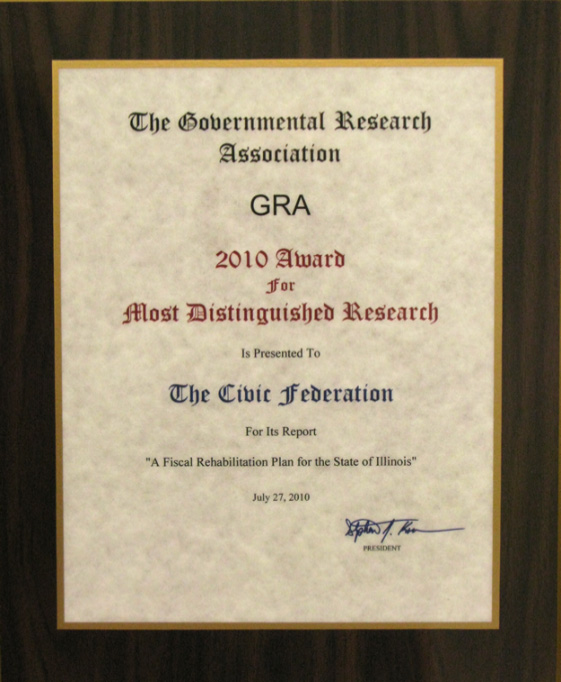
2010
A Fiscal Rehabilitation Plan for the State of Illinois
In 2010 the Civic Federation produced a special report to address Illinois’ financial crisis: A Fiscal Rehabilitation Plan for the State of Illinois. The report described the basis of Illinois’ fiscal crisis and presented the Civic Federation’s plan to salvage the State’s finances, which called for a comprehensive package of budget cuts, pension reforms and revenue increases to put Illinois on solid financial footing and address its nationally-recognized fiscal crisis.
The report received the Governmental Research Association’s Most Distinguished Research Award for 2010.
2010
TIF Transparency Reforms
A tax increment financing (TIF) transparency bill (Public Act 096-1335) passed by the Illinois legislature in May and signed into law by Governor Pat Quinn on July 27 includes a number of long-standing Civic Federation recommendations detailed in the Federation’s 2007 TIF report. The Civic Federation worked with Sen. Christine Radogno on crafting the legislation.

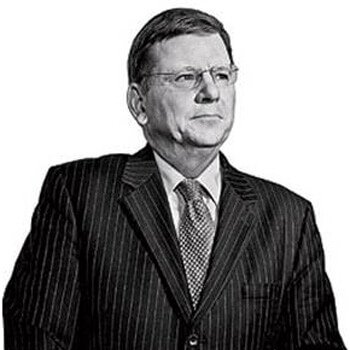
2011
Laurence Msall, in Conversation with Chicago Magazine
This photograph of Civic Federation President Laurence Msall, by Bob Stefko, accompanied a Q&A with Laurence that was published in Chicago magazine in October 2011. The question and answer here are excerpted from that interview.
Jeff Bailey: … Your staff of 12 pumps out research recommending public entities behave in more businesslike ways. What’s the batting average in getting your advice taken?
Laurence Msall: It’s hard to assign a batting average. We tend to hit a lot of singles. Performance management at the County Board [pushed by Preckwinkle] has its roots at the Civic Federation. Chicago City Colleges recently passed a budget that followed all the recommendations the Civic Federation has been giving them for years.
2011
State Pension Reform Progress
In December 2011, Illinois Governor Pat Quinn signed into law two bills that represented significant first steps toward pension reform in Illinois. Senate Bill 1946 reduced pension benefits for State and local public employees not yet hired, and Senate Bill 3538 did the same for police and fire employees. The Civic Federation had long recommended similar reforms to the state pension system.

2011
Cost-Savings for Public Transit Entities
Transit operators were expected to save $37 to $90 million per year following the repeal of the Seniors Ride Free subsidized transit program, which took effect when Governor Pat Quinn signed Public Act 096-1527 into law. The Civic Federation was one of the strongest and most consistent voices calling for the repeal of the Seniors Ride Free program for all but the lowest income seniors.

2011
The First City of Chicago Roadmap
In 2011 the Civic Federation published its first ‘City Roadmap’ report: Recommendations for a Financially Sustainable City of Chicago. The purpose of the report was to provide the City of Chicago’s Mayor and City Council with detailed recommendations on ways to address the City’s serious financial challenges. The roadmap report has since become a staple of the Civic Federation’s research products and is released at the start of each new mayoral administration.


2013
The Founding of COFA
In 2011’s Recommendations for a Financially Sustainable City of Chicago, the Civic Federation recommended creating a City of Chicago policy analysis office. In December 2013, the City Council approved an ordinance to establish the City Council Office of Financial Analysis (COFA), which provides financial analysis on the annual budget.
2013
Pension Reform Advocacy
The Civic Federation has advocated for pension reform in various forms for decades. In 2013, in response to pension challenges that had come to a head after the financial crisis of 2007-2008, the Illinois General Assembly passed comprehensive pension reform legislation for four of its five pension funds that was intended to scale back the State’s massive pension obligations while preserving its retirement systems for current and future retirees. One year later, the Illinois General Assembly approved Senate Bill 1922, containing reforms and funding increases intended to stabilize the financial condition of the Chicago Municipal and Laborers’ pension funds. After both bills were signed into law, they were challenged as unconstitutional and the Illinois Supreme Court eventually struck down both laws. In January 2015, the Civic Federation submitted an amicus brief in an effort to preserve the pension reform laws.

2014
Annex, Consolidate, Dissolve
Public Act 098-1002 became law in August 2014, granting authority to certain local governments in Illinois to annex, consolidate or dissolve themselves. The Civic Federation had previously conducted research and advocated around this issue, and it was one of the goals of the Federation’s 2014 Legislative Agenda to allow voters across the state the option to dissolve their township government through a referendum.

2014
Civic Federation Board of Trustees Founded
Expanding the capacity, expertise and strategic orientation of its leadership, the Civic Federation founded its Board of Trustees in 2014. The inaugural group of Trustees included Robert J. Buford, Lew Collens, Lester Crown, Anne Dias-Griffin, Paul V. La Schiazza, Michael J. Sacks, Nancy Searle, Harrison I. Steans and Barbara Stewart. Since that time, the provided key insights to the Federation’s president on priorities and strategy, including the organization’s long-term financial viability.

2014
Analyzing Unincorporated Cook County
The Civic Federation released Unincorporated Cook County: A Profile of Six Townships and Preliminary Recommendations to Facilitate Incorporation in 2014. The report analyzes unincorporated areas in Cook County and the potential costs to provide services to these areas. In 2016, the Federation published a follow-up report that built extensively on the 2014 report and included recommendations on how Cook County can improve general management of the unincorporated areas.


An aerial view of the Illinois State Capitol dome and Springfield skyline.
2015
Illinois Budget Impasse
From 2015 to 2017, the Civic Federation provided analysis and recommendations that illuminated the impacts of the budget standoff and helped hasten its end.
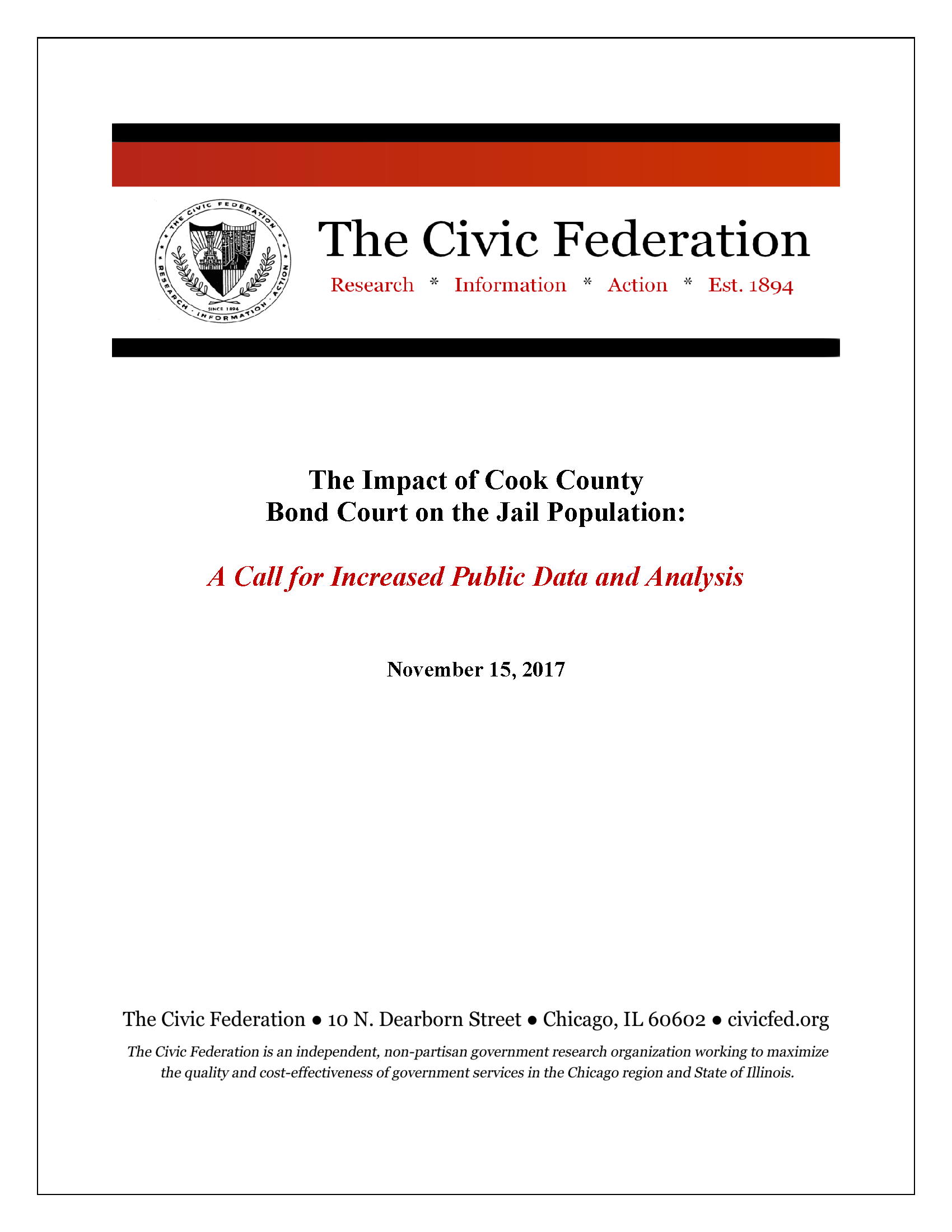
2017
The Impact of Cook County Bond Court on the Jail Population
In 2017, the Civic Federation published a report that called for increased public data and analysis surrounding the impact of Cook County’s bond court on its jail population. The report examined efforts to reduce the number of detainees in Cook County Jail by reforming practices in and around bond court, and included recommendations for improving data accessibility and coordination among the various agencies that make up the County criminal justice system.
2018
Kearney Center for Public Pensions
The Kearney Center was a project established by the Civic Federation in 2018 to advance opportunities for public pension reform in Illinois. The Kearney Center working group, which eventually became its Board, was comprised of independent business, finance, legal and civic leaders. The Kearney Center met with State and local leaders over the next few years to advocate on behalf of their plan, which included consolidation of local pension funds at the state level.

2019
Fostering Transparency in Government
In 2019, the City of Chicago voted to require committee hearing meetings to be broadcast or aired via the Internet, and the Chicago Public Schools Board of Education completed their first livestream of their board meeting. For several years prior, the Civic Federation had called on Chicago Public Schools and the City of Chicago to livestream certain meetings.

2019
A Call for Data on Pretrial Actions and Outcomes
In 2019, Civic Federation President Laurence Msall provided testimony and urged the Commission on Pretrial Practices to recommend the creation of a statewide system for the collection and public dissemination of data on pretrial actions and outcomes. One year later, the Commission of the Illinois Supreme Court released a report, The Illinois Supreme Court Commission on Pretrial Practices, which recommended the Illinois General Assembly should allocate sufficient funding to implement and sustain a robust individual-level data collection system for statewide uniform reporting.

2019
Public Safety Pension Fund Consolidation
In October 2019 the Illinois Pension Consolidation Feasibility Task Force, convened by Governor JB Pritzker, issued a report recommending the consolidation of the assets of the hundreds of downstate and suburban police and fire pension funds to improve returns and reduce administrative costs. Legislation was eventually passed later in 2019 and signed into law by the Governor that implemented the consolidation and was upheld in a 2024 ruling by the Illinois Supreme Court.

2020
Improving Cook County Inspector General’s Office Reports
The Cook County Board approved changes in the operations of the County’s Inspector General’s Office. Some of those changes had been recommended by the Civic Federation, such as efforts to improve public understanding of the Office’s reports. For example, the Civic Federation recommended that agencies under scrutiny be provided with advance copies of the findings of audit-like investigations and given the opportunity to submit written responses to be included in the Inspector General’s final published report.

2020
Circuit Court Clerk of Cook County Reform Recommendations
In December 2020, for the first time in twenty years, a new Clerk of the Circuit Court of Cook County was scheduled to take office. In preparation, the Civic Federation partnered with the Chicago Council of Lawyers and Chicago Appleseed Center for Fair Courts to publish the paper New Directions for the Office of the Clerk of the Cook County Circuit Court: Recommendations for Planning and Transitioning to New Leadership. The report presented ideas to reform and modernize the Cook County Court Clerk’s Office.
In February 2022, the Civic Federation, the Chicago Council of Lawyers and Chicago Appleseed Center for Fair Courts released a follow-up report on the new Cook County Circuit Court Clerk’s first full year in office. The report found that the Clerk’s Office made meaningful progress in several areas based on the recommendations of the 2020 report, including complying with the Shakman hiring process, staff training, and initiatives aimed at improving customer service, but that much work remained to be done to bring the office up to the standards of technological effectiveness and customer service that are needed in a twenty-first-century public agency.

2020
Advocating for Federal COVID-19 Relief
In May 2020, as the COVID-19 pandemic continued to have dire impacts on the world economy, the Civic Federation joined other civic leaders and state and local government officials in advocating for the Illinois Congressional delegation to work to expand federal pandemic assistance to state and local governments to replace revenues lost due to the pandemic and protect the critical services provided by those governments.

2021
Elected School Board Opposition
In 2021 the Illinois House of Representatives and the Illinois Senate considered legislation that would establish a 21-member elected Chicago School Board. In response, the Civic Federation published a position statement in opposition to the legislation. The Federation argued the governing board would be too large to be effective, lead to expensive and divisive political campaigns funded by interest groups, allow the legislature to create gerrymandered electoral districts, not necessarily lead to improved educational outcomes and create a potential financial disconnect between the City of Chicago and the Chicago Public Schools.

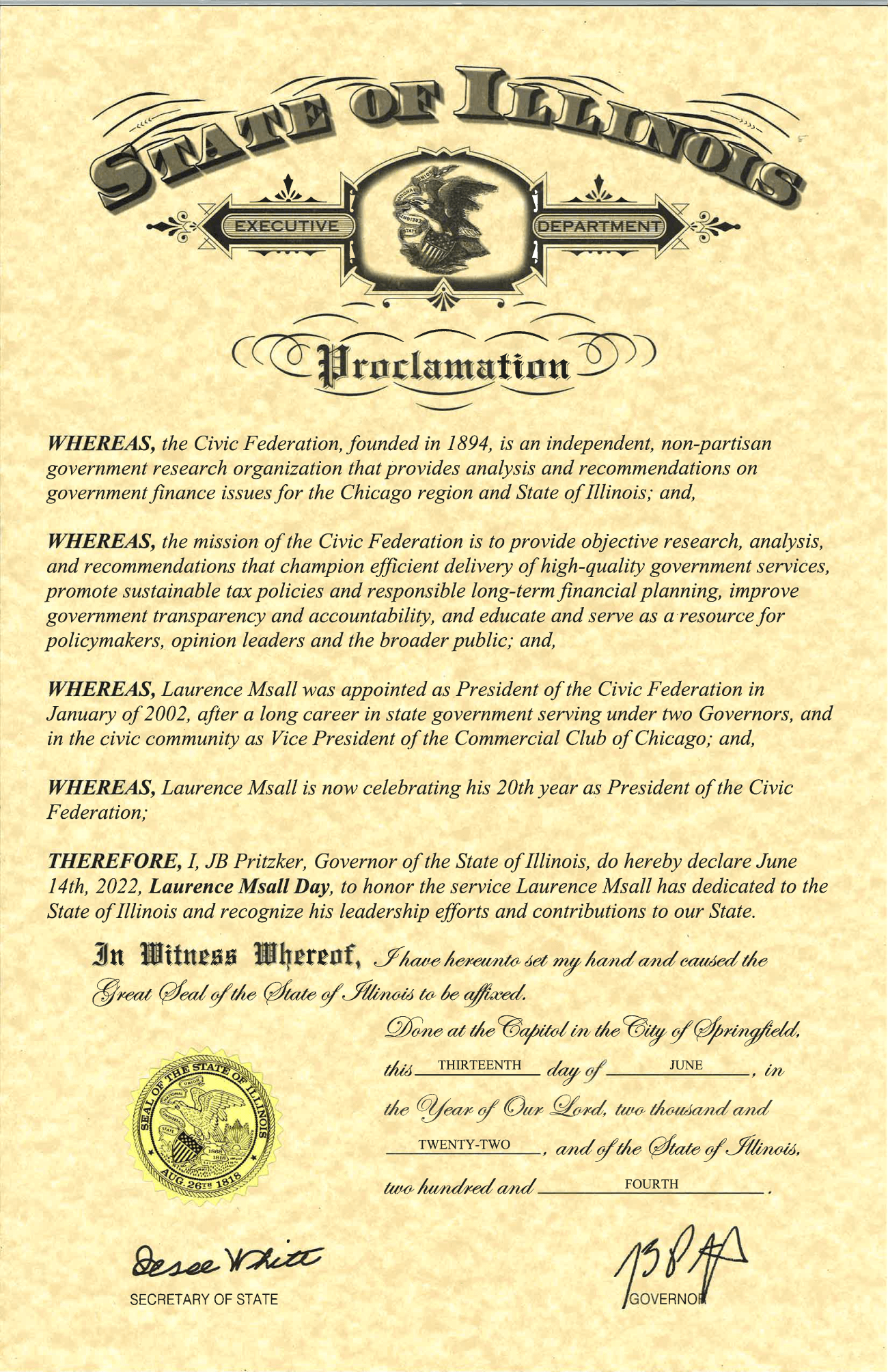
2022
Laurence Msall Day
On June 14, 2022, Illinois Governor J.B. Pritzker declared June 14, 2022, to be Laurence Msall Day. The tribute was established via a proclamation honoring Laurence’s career achievements and celebrating his 20th year as president of the Civic Federation.
One year later, the staff of the Civic Federation, who’d unexpectedly lost Msall in February 2023, shared the following statement on social media, in remembrance of Laurence:
The staff of the Civic Federation will continue to celebrate our late president on this day going forward by listening to Bruce Springsteen, striking up a conversation with a stranger on the street and advancing our mission to make government more effective in Illinois.
2022
Measuring the Spending and Performance of Federal COVID-19 Relief Funds
In its analysis of the Chicago and Cook County FY2022 budgets, the Civic Federation urged both governments to produce American Rescue Plan Act performance reports to help the public understand how the funds were being spent to achieve goals and evaluate whether the programs were successful. Afterward, the City of Chicago began establishing a project management office to handle implementation and performance measurement for its ARPA funds in the Recovery Plan. Meanwhile, Cook County released performance reports and began creating a Program Management Office to help develop metrics for each program and provide support and technical assistance.

2022
Support for the Forest Preserve District
Prior to the fall 2022 election, the Civic Federation advocated for the passage of the Forest Preserve District of Cook County’s (FPDCC) property tax extension limitation law (PTELL) referendum, which asked the Cook County electorate whether the Forest Preserve District’s property tax limiting rate should be increased by 0.025% in property tax levy year 2022. Cook County voters went on to approve the referendum.

2022
Cook County Bond Court Observation Study
In the summer of 2022, the Civic Federation, in partnership with the League of Women Voters of Cook County, observed felony bond court hearings in Cook County, collecting data in 1,052 individual bond hearings including the name of the judge, the defendant’s charges, release recommendations based on pretrial risk assessments and the judges’ ultimate release orders, including any conditions of release. In a report released in November 2022, the Federation shared the findings of the study, which helped educate public officials and the general public while also informing a statewide debate on the issue of cash bail and forthcoming changes to the pretrial release process in Illinois.

2023
Laurence Msall, Longtime President of the Civic Federation, Passes Away
“While Laurence was the Civic Federation to so many in the community, his real legacy was in helping to make the Civic Federation the indispensable voice for fiscal responsibility throughout the state of Illinois and that mission will go on through the outstanding staff that Laurence developed.”
—The Civic Federation
On Feb. 4, 2023, the Civic Federation suffered a terrible loss with the unexpected passing of its longtime leader, Laurence J. Msall, following a scheduled heart surgery. Laurence was 61 years old and had served as the Civic Federation’s president for 21 years. His loss was felt widely across the State of Illinois, especially among his family and close friends, his Civic Federation family, and Chicago’s broader government, civic and business leaders, with whom he’d worked closely for many years. Laurence’s obituary is available here.
As part of the Civic Federation’s efforts to permanently honor Laurence’s legacy, the organization in 2023 renamed its prestigious Lyman J. Gage Award for Outstanding Civic Contribution by a Chicagoan as the Gage-Msall Award. The first Gage-Msall Award will be presented at the 2024 Annual Civic Awards.
Watch a tribute video in remembrance of Laurence. The video was presented during the Civic Federation’s 2023 Annual Civic Awards, held on June 28 at Navy Pier’s Aon Grand Ballroom.
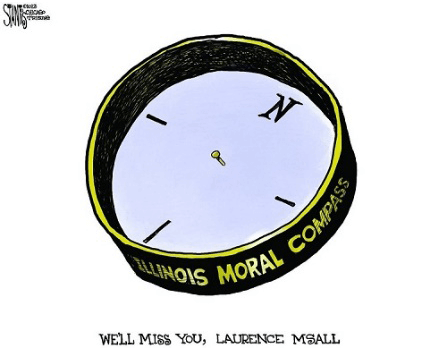
2023
Illinois Moral Compass
An editorial cartoon by Scott Stantis for the Chicago Tribune paid tribute to Laurence Msall in the Wednesday, Feb. 8, 2023, edition of the newspaper.
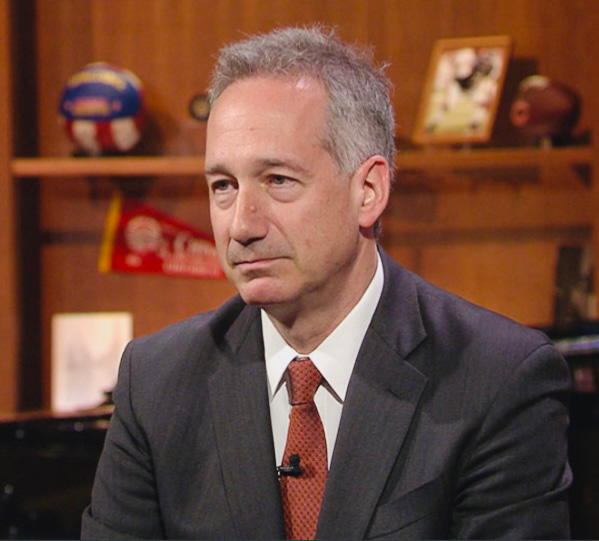
2024
Joe Ferguson Named President of the Civic Federation
Joe Ferguson began his tenure as the new president of the Civic Federation in January 2024. Joe brings deep expertise in the areas of government transparency, efficiency and effectiveness, having previously served as City of Chicago inspector general from 2009 to 2021 in addition to spending 15 years with the United States Attorney’s Office for the Northern District of Illinois. Learn more about Joe’s hiring and background and read a Q&A with him.
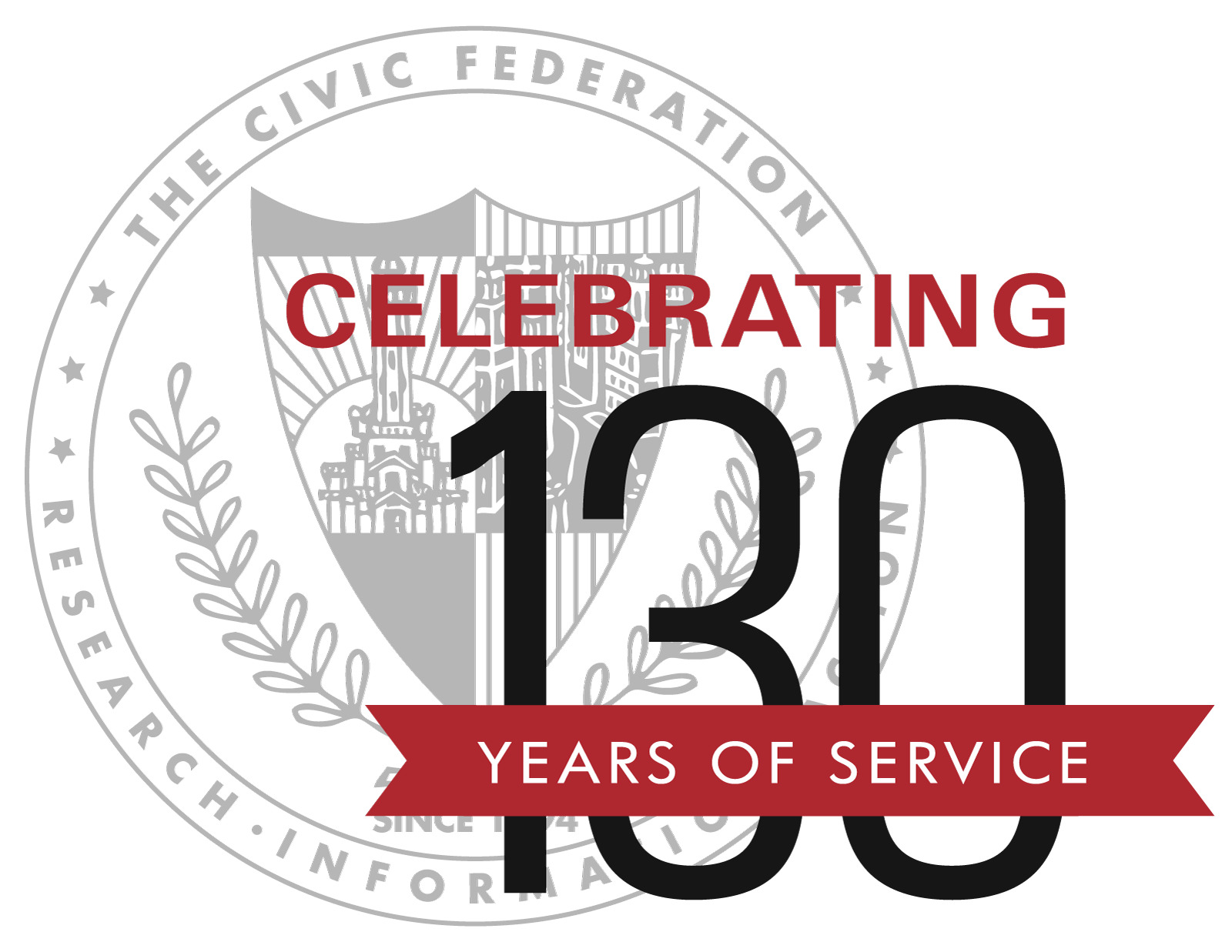
2024
Civic Federation Celebrates 130th Birthday
On February 3, 2024, the Civic Federation celebrated its 130th birthday with the launch of this historical timeline and a social media post series showcasing highlights of the Federation’s storied history. As it enters its next great chapter under new leadership and embraces an evolving strategic vision, the Federation looks forward to continuing its longstanding mission of championing sustainable tax policies, responsible long-term financial planning, high-quality government services, and improved government transparency for the Chicago region and State of Illinois.


